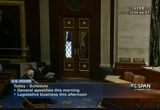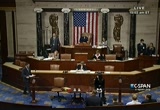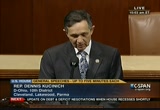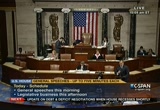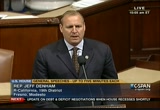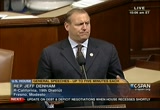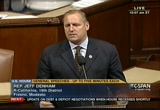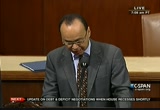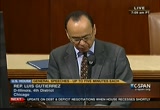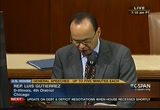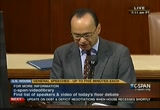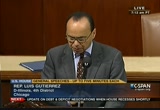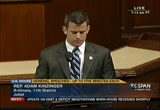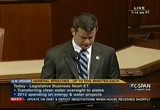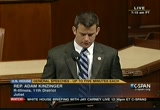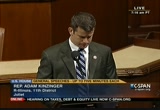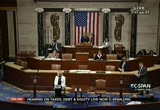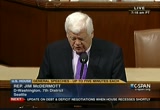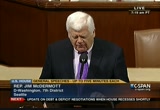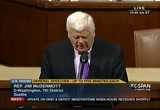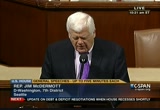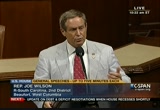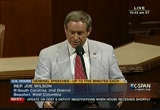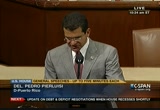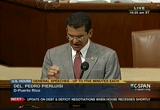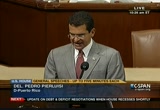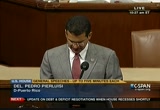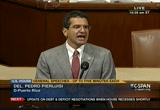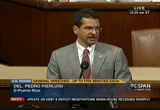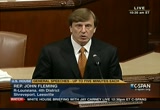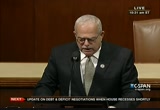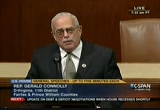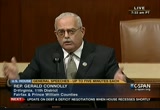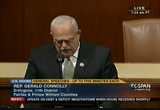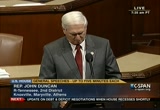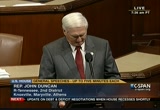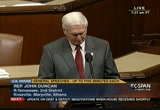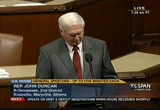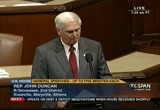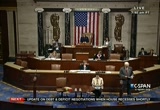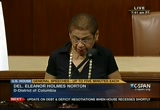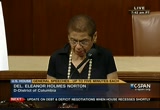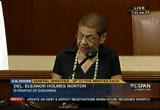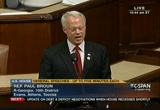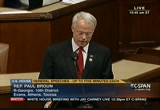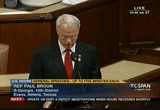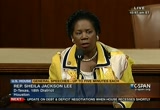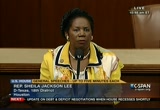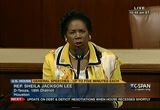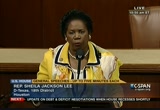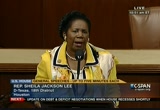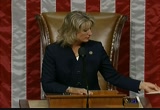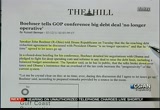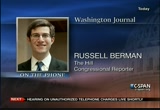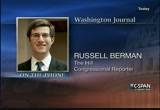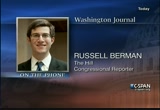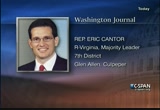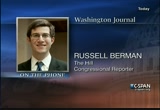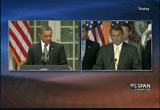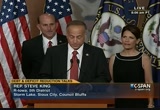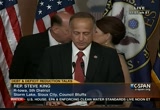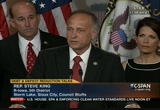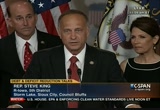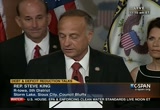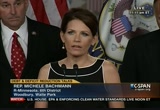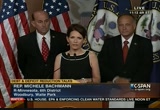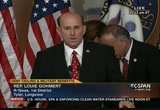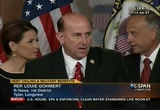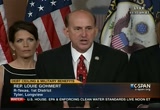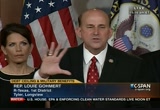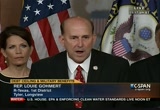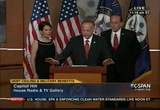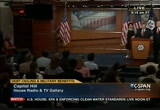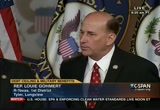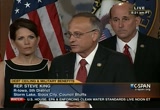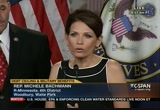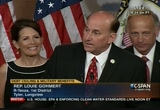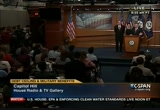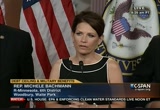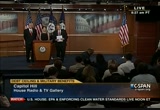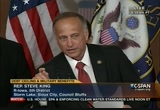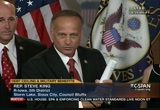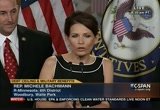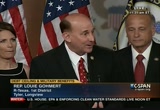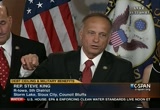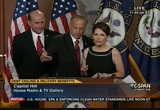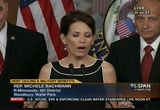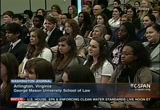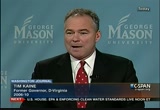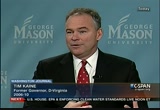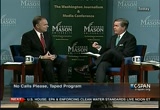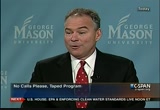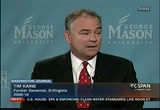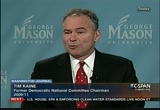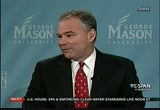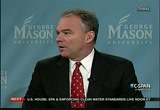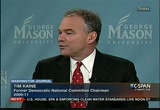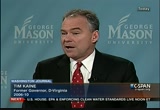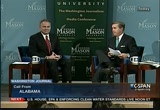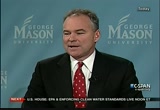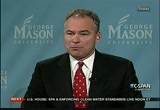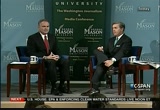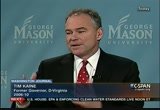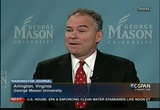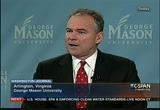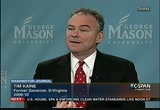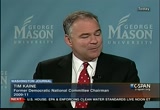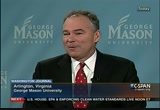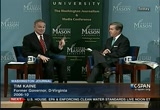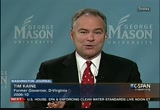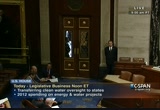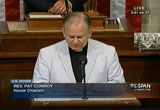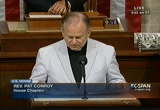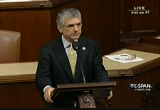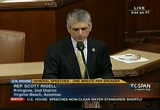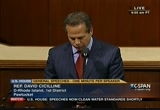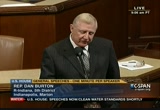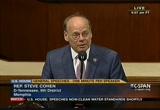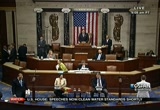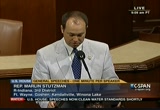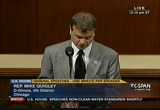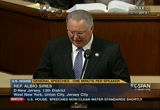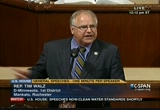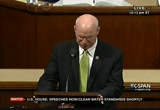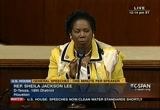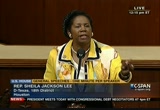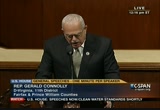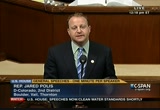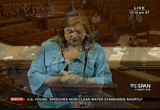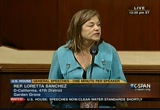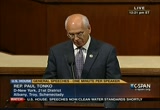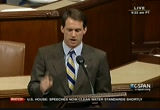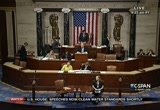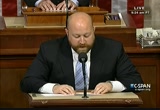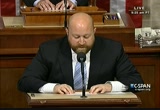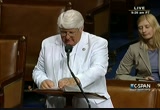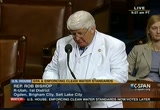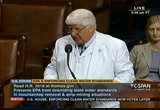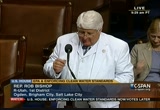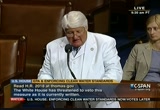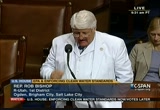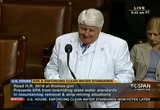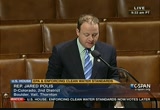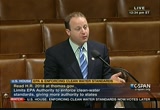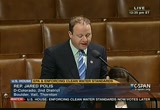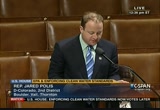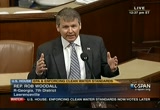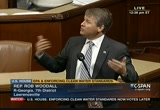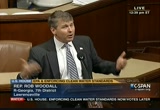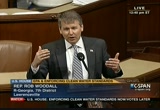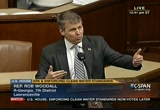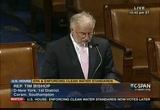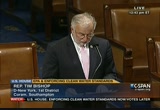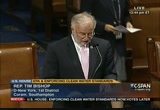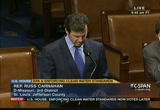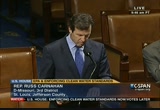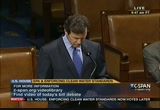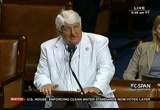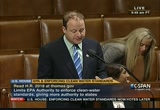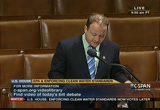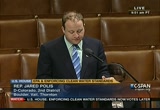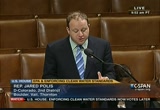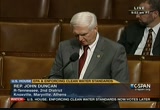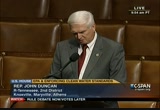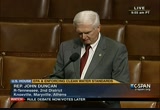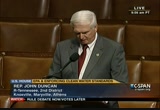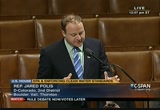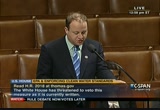tv U.S. House of Representatives CSPAN July 13, 2011 10:00am-1:00pm EDT
10:00 am
eastern. enjoy your day. we take you live to the house of representatives. a number of issues coming up, focusing on the president and congressional leaders with a four of those negotiations. live coverage on the c-span networks and c-span radio. have a good day. [captioning performed by national captioning institute] [captions copyright national cable satellite corp. 2011] [captioning made possible by the national captioning institute, inc., in cooperation with the united states house of representatives. any use of the closed-captioned coverage of the house proceedings for political or commercial purposes is expressly prohibited by the u.s. house of representatives.]
10:01 am
10:02 am
2011. i hereby appoint the honorable renee l. ellmers to act as speaker pro tempore on this day . signed john a. boehner, speaker of the house of representatives. the speaker pro tempore: excuse me. pursuant to the order of the house of january 5, 2011, the chair will now recognize members from lists submitted by the majority and minority leaders for morning hour debate . the chair will alternate recognition between the parties with each party limited to one hour and each member other than the majority and minority leaders and the minority whip limited to five minutes each but in no event shall debate continue beyond 11:50 a.m. the chair recognizes the gentleman from ohio, mr. kucinich, for five minutes. mr. kucinich: three months ago
10:03 am
276 experts on social security, the federal budget or the economy wrote to president obama, quote, to correct a commonly held misconception that social security somehow contributes to the federal government's deficit, unquote. despite the fact that social security has a $2.6 trillion surplus and can pay 100% of its benefits through 2037 without any cuts or tax increases, president obama declared yesterday that social security checks may not go out after august 2. presumably unless there's a deal on the federal deficit which has nothing to do with social security. according to today's "washington post," 15 years ago
10:04 am
congress passed laws which stated social security did not count against the debt limit and gave treasury clear authority to use social security trust funds to pay benefits and administration expenses in the event a debt ceiling is reached. a fake social security crisis will do mog to solve a real debt crisis, will undermine the public's faith in government and will create unnecessary anxiety among our elderly. stop playing political games with social security. i yield back. the speaker pro tempore: the chair recognizes the gentleman from california, mr. denham, for five minutes. mr. denham: thank you, madam
10:05 am
speaker. with the june national unemployment rate at 9.2% and consistent double digit unemployment in my district, we must get americans back to work. june marks 29 consecutive months where we've had unemployment at or above 8%. averaging 9.5% during that time. unemployment hasn't been above 8% for that length of time since the great depression. we got to start utilizing the policies that will get americans back to work. we need to make sure that we are reducing the regulations and having the economic policies to get americans willing to take the risk, the risk to go out and borrow money to start a business, willing to take the risk to not only hire employees but actually to make sure that they are willing to have that long-term employment, making sure they have the promise to that employee that they're going to be able to continue that job on.
10:06 am
we got to get americans the -- give americans the opportunity to take the great risk in our economy. we also need to unleash the strength of our nation by utilizing our natural resources. here's the greatest opportunity we have as a nation to get americans back to work is by utilizing our own natural resources. in my area where we got double digit unemployment we have water shortage that causes our agriculture to leave land fallow, leaving thousands unplanned parenthood. by getting the water flowing again, we cannot only get -- if we don't use the natural resources we have in our forests, if we don't manage our timber harvesting plan, not only will we see the lack of employment opportunities but we'll see devastation. we'll see fires because the forests will manage themselves if we don't manage the forests
10:07 am
for them. we need to make sure that as we're looking across the nation our oil reserves. between our oil, our natural gas, our shale reserves, we have the largest resources in the world. we just got to be willing to tap into them. we need to shorten the time on permits. we need to reduce the regulation so we can actually go in and get the oil so we're not dependent on other nations. these aren't republican jobs. these are not democratic jobs. these are american jobs that we got to go out, stand strong on cutting the regulation, on getting the right economic policies, getting the permits moving again so we can actually utilize our natural gas, utilize our oil, utilize our oil shale so we are not relying on other nations, relying on our timber harvesting and
10:08 am
utilizing our water so we can get agriculture moving again. ladies and gentlemen, we got a job to do here in congress. we got to get the american jobs moving again. that's going to be utilizing our natural resources and getting americans willing to take the risk on our economy, willing to invest, willing to borrow money to start a new business and willing to go out there and promise a new employee not only that they'll have a job but a long-term job. we have the power to do that here in congress. we need to have the will. madam chair, i yield back. the speaker pro tempore: the chair recognizes the gentleman from illinois, mr. gutierrez, for five minutes. mr. gutierrez: madam speaker, i rise today to honor a towering figure in puerto rican history and culture. puerto rico and the world lost a pioneering and leading scholar last week with the passing of done ricardo
10:09 am
alegria. his study of the history and culture of the indians of puerto rico was groundbreaking work. by helping puerto ricans to understand the african and european heritage as well as many other important aspects of puerto rican history and culture, don ricardo helped us better understand who we are, where we came from and what being puerto rican really means. he's not only a scholar to help puerto ricans understanding our history, he was a determined and proud man that refused to let our culture forgotten and destroyed. he was part of the institute of puerto rican culture and many other research, cultural and other institutions. in this role he was a warrior defending our cultural heritage. it's not an exaggeration to say without his leadership and tenacity the old buildings of san juan which are loved by puerto ricans and visited by
10:10 am
millions around the world would not be standing today. he wanted to make sure that the historical significance was understood by all. he made us be proud to be puerto rican. he embraced what makes puerto ricans unique and understood we have our own identity and never run away from it, we should celebrate it. without question, he loved our people and our history. i offer don ricardo alegria my thanks and his dedication to puerto rico, his leadership for the people and the way we elevated our history. at this time of crisis in puerto rico, though that seem to forget the traits that make our island our island and make our history our history, don ricardo was very supportive of my work in congress. the inspiration of towering puerto rican figures like don ricardo motivate me to denounce the attacks on the civil and human rights of puerto ricans.
10:11 am
these attacks come from the same quarter don ricardo fought all his life. they seek to destroy the national culture and island of puerto rico and they have not succeeded and never succeed because there will always be puerto ricans like don ricardo standing defiantly and proudly in their way. this fact was driven home in congress just yesterday, mr. speaker. at a well-intended briefing conducted by the aclu, the national institute for puerto rican latino policy and the legal defense and education fund, as part of their briefing, these organizations showed a video depicting some of the many themes of violence by the police of puerto rico against unarmed and peaceful protestors. i have seen this video and i am certain that many members that see these images would be moved to indig nation and action, that these things happen under the american flag and these abuses are committed against american citizens is simply shameful. if any of my colleagues saw these images, i am sure they
10:12 am
would feel the same thing i felt when i saw them. mr. speaker, it's out of my deep concern for the people of puerto rico that i wish to inform my colleagues that i have sent a letter today to the attorney general, eric holder. this letter requests the release of any and all documents and information regarding contacts by officials or representatives and lobbyists of the government of puerto rico with the u.s. department of justice and their civil rights division into the very serious allegations of systematic police brutality in puerto rico, an investigation that is over two years old. i have requested this information under the freedom of information act because public reports allege that the government of puerto rico is using its well-paid, top washington lobbyists and other resources to thwart the release of the justice report. it is based on a lobbying disclosure form that does not give detail on exactly what the lobbyists are doing for the government of puerto rico. given the recent history of the ruling party of puerto rico in
10:13 am
working in secrecy, these reports have raised serious doubts in my mind. mr. speaker, i want to make it clear, while there may not be transparent of government in puerto rico or freedom of information act there, as far as the government is concerned, the secrecy and the impunity of the regime in puerto rico ends here. thank you, mr. speaker. the speaker pro tempore: the chair recognizes the gentleman from illinois, mr. kinzinger, for five minutes. mr. kinzinger: well, thank you, madam speaker. last friday, something actually very great happened. wisconsin bamed the 49th state in the union to approve conceal carry. well, that means that leaves my home state, illinois, as the last state to recognize that constitutional right to conceal carry. the action taken by governor scott walker was a major step for wisconsin but the state of illinois remains the only state in the nation to prohibit conceal carry and deny
10:14 am
law-abiding citizens rights to protect themselves or their family. the constitution of the united states and 44 states common law and laws of all 50 states recognize the right to use arms in self-defense. in 1895 the supreme court case, beard vs. the united states, approved the common law rule that a person may repeal force by force in self-defense and concluded when attacked a person is entitled to stand his ground and meet any attack made upon him with a deadly weapon. in 2008, supreme court ruled in district of columbia vs. heller that the inherent right of self-defense has been central to the second amendment right. and that the amendment protects the individual right to possess and carry weapons in case of confrontation. right to carry laws have proven to be effective. since 1991 through 2009, 23 states have adopted the right to carry and violent crime
10:15 am
rates have declined 43%. this all comes on the heels of a five-fold increase in the number of shall conceal carry case since 1986 to 2006. along with this, since the 1980's, when concealed carry issues started, the number of permit holders is estimated to have raise from one million to six million people. of major note, murder has declined 49%. also, the city with the highest gun homicide rate in the nation, washington, d.c., happens to also have the strictest gun control. the lowest rate of gun homicide is in the nation of utah which has some of the most liberal policies when it comes to conceal carry. according to the f.b.i., the total number of violent crime and murder dropped 6% during the first part of 2011. gun advocates are in disbelief over these numbers. and this nation, not only going through an economic downturn, have seen this. the number of background checks
10:16 am
broke record levels, more than 14 million, last year alone. that's a 55% increase in firearms purchases in just four years, but it has not even led remotely close to the doom and gloom and half ock being done by anti-gun activists. national crime victimization survey concluded that robbery and assault victim who use a gun to resist will be less likely to attack or suffer an injury than those who use any other methods of self-protection or those who did not resist at all. unfortunately, in my home state in illinois, governor quinn determined what is best for illinois. rearg than listening to the voice of the illinois constituency, quinn made desperate 11th hour phone call to sway democratic colleagues to his side and block conceal carry in illinois. he knows better than 49 other states and he knows better than top law enforcement organizations like the illinois state chiefs of police, chicago
10:17 am
police lieutenants association and chicago police sergeants association. quinn doesn't get it but 49 other states do and so do i which is why i am a proud co-sponsor of h.r. 822, the national right to carry reciprocity act of 2011 which was introduced by my colleague, representative cliff stearns of florida. this allows any person with a state issued conceal to carry in every other state. their states will apply. in illinois, i refuse to deny visitors the right to carry weapons when they are so authorized to do so. . we must allow law-abidinging citizens to own and bear arms. we must restore, defend, and preserve this constitutional right at all government levels. i yield back. the speaker pro tempore: the chair recognizes the gentleman from washington, mr. mcdermott, for five minutes. mr. mcdermott: i ask unanimous consent to revise and extend my remarks. the speaker pro tempore: without objection.
10:18 am
mr. mcdermott: madam speaker, over the past several weeks we have been debating ways to reduce the federal deficit. republicans have said that everything is on the table and that nothing is sacred, but that just isn't true. the republicans refuse to cut tax give aways to the wealthy and special interests in this country, and when it comes to discussing the merits of continuing our efforts in afghanistan, the republicans clamor to defend it despite our fiscal mess. i want to remind my republican friends the situation we are in now is not new. throughout history from rome to the ottoman empire to the soviet union the over extension of military and protracted struggles in foreign countries has crippled empires. some historians have credited ronald reagan for the soviet union's collapse but what really bankrupted the soviet union was its wars, just like us, they paid a crushing price both
10:19 am
financially and morally in afghanistan. overextending geopolitically comes at a cost over time in any nation that thinks otherwise is setting itself up to repeat the mistakes of the past. as of today, the united states has spent more than 2 1/2 times the percentage of g.d.p. on afghanistan that the -- than the soviet union spent on its g.d.p. during its nine-year war in afghanistan. public polls are clear, americans know the cost of the war in afghanistan is unsustainable and want us to withdraw as soon as possible. when it comes to cutting back on support for the neediest americans, we can't seem to face the urgent reality that the money that we spend abroad needs to be spent here at home. the financial facts tell the story, taxpayers in my district in seattle have spent $1.1 trillion -- billion for afghanistan war to date. think about that. one city, $1.1 billion.
10:20 am
for the same amount of money we could provide health care for 700,000 children from low-income families or put 125,000 kids in head start or health care for 150,000 more veterans. imagine how different it would be if states like wisconsin which faces a $3.6 billion budget deficit did not have to bear the cost of the war in afghanistan. so the question before us is simple, what is our priority? fighting a war with no end? or investing in the american people? the answer lies in what kind of country we are. what legacy we leave behind to our children and our grandchildren. and transcending political decisions toward a common commitment to make america strong again. america will cease to be a world power if we fail to support the domestic foundations of our nation. yet the house that does not even blink as it approves a $650
10:21 am
billion defense budget last friday. while the republicans were cutting any spending that helps people, they didn't so much as flinch as they threw hundreds of billions of dollars into the bottomless pit of the defense budget. we need to stop seeing the world through the lens of constant threat and foster a sense of the common good. and shared responsibility. that not our military footprint, is what will advance our interests in the world and make us confident again. in a national poll conducted last year, 47% of americans rated china's economy as the strongest economy in the world. our crumbling roads reflect our crumbling self-confidence. our national priority, prosperity, is vital to our national security and that is why i believe getting out of afghanistan must be the center of raising and reducing our deficit.
10:22 am
anything short of that would ignore the fiscal reality and the will of the american people to end the afghanistan war. we have a choice before us. continue the war and continue downhill, or stop the war and start up the hill to regain what we have lost over the last few years. i yield back the balance of my time. the speaker pro tempore: the chair recognizes the gentleman from south carolina, mr. wilson, for five minutes. mr. wilson: thank you, madam speaker. madam speaker, before i begin i'd like to join with my colleague, congressman adam kinzinger, and congratulate the people of wisconsin on passing a concealed weapons bill. i think they'll find as we have found in south carolina that having a concealed carry permit, we call it the law-abiding citizen self-defense act, that the consequence of this, a number of years ago now, has been a reduction in crime. and in fact many of the people who as i was a floor leader in the state senate to propose the
10:23 am
concealed carry law, so many other people who opposed it, and they opposed it thinking they were doing it correctly, have subsequently told me that they really are thrilled that now it has passed. that it indeed has promoted a reduction in crime in our state. and i know the same will be true in wisconsin and possibly one day in illinois. madam speaker, time is running out for the american people. with just weeks to go before our country defaults on its debts, liberals in congress continue to roadblock any progress on real spending cuts. the american people want to see spending reforms. the administration can cut other federal spending before it allows a default on the u.s. debt. americans understand that the federal government is burdening future generations with debt by borrowing over 40 clents of -- cents of every dollar it spends. senior citizens are at risk with the value of the dollar in question. americans want to see meaningful
10:24 am
spending reform. liberals want to play political games. republicans have been trying to lead on spending reform. from the moment this new congress has been in session, house republicans have passed numerous bills that cut spending, curb government growth, and encourage job growth for american families. the latest news on the debt limit talk shows yet again how out-of-touch this current administration is with the american people. cut the spending. do not impose new taxes which will kill jobs which need to be developed by small businesses. in conclusion, god bless our troops, and we will never forget september 11 and the global war on terrorism. madam chair, i yield the balance of my time. the speaker pro tempore: the chair recognizes the gentleman from puerto rico, mr. pierre luisy -- pierluisi for five minutes. mr. pierluisi: i rise this morning to discuss the issue of federal support for health care in puerto rico and the other
10:25 am
territories. this is a story of unprecedented progress, but it is also a chronicle of continuing challenges. while the treatment of the territories on their federal health care programs have substantially improved in recent years, serious disparities still remain. the consequence of this inequality is not difficult to discern. last month a study found that patients at hospitals in the territories faired significantly worse than patients at hospitals in the states. the study cited funding disparities under medicaid and medicare along with the territories' lack of voting representation in the federal government as likely causes for this discrepancy. this article concluded that eliminating the substantially quality gap in the u.s. territories should be a national priority. consider medicaid which helps our most vulnerable citizens. medicaid has always operated
10:26 am
differently in the territories. the federal government pays at least 50% of the programs' cost in the wealthiest states and upwards of 80% in the poorest states. by contrast, federal law imposes an annual cap on funding in the territories. historically puerto rico's cap was so low that the federal government paid less than 20% of medicaid costs on the island in any given year. inadequate, total funding have made it difficult for puerto rico to provide quality health care to its low-income population. if the purpose of this policy was to save the federal government money, it was shortsighted. between 2005 and 2009 over 300,000 puerto rican residents moved to the states. many were men and women of limited means who upon you migrating immediately became eligible for full benefits under medicaid and other federal
10:27 am
programs. the last congress my fellow delegates and i fought hard to ensure our constituents were treated in an equitable manner in the affordable health care act. under the law, funding for puerto rico's medicaid program will triple over the next decade. though it is far less than puerto rico would receive if treated like a state, this increased funding does represent a significant step towards parity. but the affordable care act did not eliminate serious disparates facing my constituents. for example, puerto rico's still subject to unequal treatment under medicare. although island residents pay the same payroll taxes as their fellow citizens in the states, ill-conceived federal formulas provide lower medicaid reimbursement to puerto rico hospitals. despite the pressing need to correct all these disparities, i know that to legislate effectively you must choose your battles wisely, especially in a
10:28 am
fiscal climate as challenging as the one our country faces today. therefore, i have introduced three health bills that would correct this unprincipled inequality and do so in a fiscally responsible way. the first bill attends the high tech act which provides payments to doctors and hospitals that become users of electronic health records. the act inadvertently exclude the puerto rico from the medicare payment and my budget neutral bill would include them. my second bill which has bipartisan support would modify a unique federal law that makes it more difficult for puerto rico seniors to enroll in medicare part b and would reduce the penalties for late enrollment. and my third bill would make it possible for territory medicaid programs to cover breast and cervical cancer treatments by voicing federal contributions for those services outside the annual cap. so, i have filed this three-cost conscious bills to address some
10:29 am
of the disparities we are facing and i hope to have the support of my colleagues when the time comes to consider them. now, a word about the current state of affairs in puerto rico. i represent puerto rico in this congress, and if we are going to be talking about a crisis in puerto rico, i'll tell you about a crisis in puerto rico. it is the high incidence of violent crime that is tied to the drug trafficking that is happening in the caribbean. and i for one am doing something productive. i'm seeking additional resources because it is in the interest of both the united states as a country, as a whole and puerto rico to increase the presence of federal law enforcement officers in puerto rico. while i want civil rights to be protected over america, what i am doing is supporting the ongoing investigation of the department of justice, but i am not denigrating the integrity of those who put their lives at risk to defend the safety of our
10:30 am
citizenry. thank you. i yield back the balance of my time. the speaker pro tempore: the chair recognizes the gentleman from louisiana, mr. fleming, for five minutes. mr. fleming: thank you, madam speaker. madam speaker, i rise today to mourn the loss of two louisiana soldiers from fort pope who recently died in low gar -- logar province in afghanistan during operation enduring freedom. staff sergeant michael garcia and sergeant christopher sutherland made the ultimate sacrifice by giving their lives in service to this nation. . it was at this point that it's important decision involving the defense of our nation becomes most personal. instead of thinking in abstract terms like casualty, weapons,
10:31 am
equipment, we are confronted with the reality that these are not just soldiers. they are in fact our friends, our neighbors, our sons, fathers, brothers. staff sergeant garcia and sergeant southerland represented the very best america has to offer. their contributions serves as an enduring reminder that the freedoms and liberties we hold so dear are afforded to us only by those who wear the uniform and loved ones who support them. let us pause today to remember the sacrifice these brave soldiers made on behalf of this great nation. and with that i yield back. the speaker pro tempore: the chair recognizes the gentleman from virginia, mr. connolly, for five minutes. mr. connolly: madam speaker, we're two short weeks away from defaulting on american debt which would devastate our
10:32 am
economy and plunge this country, if not the global economy, into a steep recession. we're engaged in three overseas wars as part of the broader struggle to defeat terrorism. century old you a to be rassies are crumbling in the middle east. extreme drought is hurting texas and oklahoma while floods of biblical proportions inundate the upper midwest. unprecedented tornadoes have killed hundreds of people in missouri, alabama and virginia while the melting of glaciers and polar ice. meanwhile, our economy stagnates with lack of any growth. in response to these exowe tension threats at home and and abroad, the republicans have broad forth a bill a ban on incandescent light bulbs signed by a republican president,
10:33 am
president bush. that's right, light bulbs. consores of internet hearsay are aware of the tea party conspiracy theorists say that president obama is trying to outlaw the incan -- incandescent light bulb. from phillips to johnson controls actually support the light bulb efficiency standard because they provide a competitive advantage over foreign manufacturers who produce shoddy, light-inefficient bulbs. who knew that the tea party contained so many sympathizers who hidden their agenda inside the folds of the don't thread on me flag. some are taxed enough already.
10:34 am
it has left these zellests with extra disposable income and they want to spend it on inefficient light bulbs. in fact, repeal of the light bulb standards would give americans the liberty to spend $85 extra per year on light bulbs to produce no additional light. it's hard to understand how ideologues in this house can suggest opposing $85 per year on their constituents in order to buy light bulbs which consume more electricity than necessary. those who are baffled by republican support for this new incandescent light bulb tax must look to the past few years. the republican colleagues deviated so far from conservation that it now supports legislation that would have air and water impunity. the bulb act, which we dealt with light -- last night, and
10:35 am
retroagreeses to the time of thomas edison and the invention of the light bulb. they must really mean it when they call themselves originalists. this entire situation would be humorous, but for the gravity of the threat our nation faces -- from climate change to the debt puzzle or the opportunities that we will forgo in the middle east because of the attack on light bulbs. i yield back. the speaker pro tempore: the chair recognizes the gentleman from tennessee, mr. duncan, for five minutes. mr. duncan: madam speaker, i request permission to address the house and to revise and extend my remarks. the speaker pro tempore: without objection. mr. duncan: madam speaker, there is much discussion these days about ethanol and for far too long the federal government has been subsidizing ethanol production in a very big way. three years ago "time" magazine called ethanol another energy biofuel the clean energy scam. yet, three years later we are
10:36 am
dumping more money than ever into the program. it is time to admit that the ethanol program has been a failure. a study mentioned in the recent column in "the washington times" said that our ethanol policies not change would cost american consumers more than $500 billion in the 10 years from 2008 to 2017. according to "time" magazine, the biofuel boom is doing the exact opposite of what it was intended to do. the article calls corn ethanol environmentally disastrous. we went heavily into ethanol because it was supposed to be good for the environment. the very powerful environmental lobby pushed hard on this. now, we have found that it has done more harm than good. even to the environment. this just goes to show that when someone says something is good for the environment it is usually because they are going to make money off of it or going to increase contributions to their organization. i have an even the greater concern that hits home with
10:37 am
every american. the ethanol program is an economic disaster. we were promised that using ethanol to fuel cars would reduce gas prices. we were told it would reduce our dependence on foreign oil. if you look at the situation today, gas prices are close to $4 a gallon or even higher in some places, and we are still at the mercy of foreign producers to supply most of our oil. the only thing the ethanol program has done is raise the price of groceries. hardworking americans are paying more for milk, needs and everyday items they need from the grocery store. this is because the price of corn has doubled in less than two years. in 2009, corn cost $3.30 a bushel. today it cost roughly $7 a bushel. when the price of corn increases it causes a chain reaction. corn is used to feed livestock which increases the price of beef and dairy products. corn syrup is found in everything from cereal to salad
10:38 am
dressing. nearly everything at the grocery store costs more today than it did just one year ago. to turn corn into ethanol it fakes diesel fuel to run the machines, fertilizer and months of hard work from farmers. a study by cornell university estimates that it cost $4.50 to produce one gallon of ethanol. a gallon of pure ethanol has only about 2/3 the energy of a gallon of gasoline. yet, a lot of things we tend to do in -- like a lot of things we tend to do here in washington, the cost is too high and average americans are the ones paying for it. in 2010 the federal government spent nearly $8 billion to subsidize ethanol program. that number is probably closer you count ion when money from state and local governments. the bottom line is corn should be used to fuel our bodies, not our cars. i'd like to take a moment to tell but a friend of mine,
10:39 am
harry. harry is the owner of his farm company. the family started this company in 1937 and is one of the great small business success stories in my district. however, in 2010, the sausage farm lost money for the first time. they are now losing money every month. they are not losing money because all of a sudden they are no longer a great company. they are losing money because the cost of raw materials is far too high. instead of paying 35 cents a pound for hogs like they did in 2009, they pay more than 50 cents a pound, more than 40% increase in just two years. 40% increase in two years. to keep up meat producers like wampler, they are forced to raise prices in the grocery store. the study i mentioned earlier by cornell estimated that in 2009 one-third of u.s. corn was used to make ethanol.
10:40 am
that is a lot of corn, but it only reduced america's oil consumption by 1.4%. in fact, if we were to take all of the corn produced and turn it into ethanol, it would replace 4% oil consumption. in this country and around the world we are destroying forests, wetlands and grasslands to make room to plant more corn. the program doesn't make sense for the economy or the environment, even though it was forced on us primarily by virmalists. a lot of politicians are afraid to admit the ethanol program was a mistake because they are afraid to defend the farm lobby and anyone considering running for president may be afraid to offend corn farmers in iowa. but, madam speaker, we can no longer afford to waste money on this program that does not work. thank you, madam speaker. the speaker pro tempore: the gentlewoman from the district
10:41 am
of columbia, ms. norton, for five minutes. ms. norton: thank you, madam speaker. i come to the floor to alert members who interfere with the local funds of a local jurisdiction not your own. in this case the district of columbia. this year it will be highlighted in your own district. the debt limit discussion spotlight differences, but one idea always has enjoyed the broadest support in this country and in this house. the federal government does not interfere with local matters, especially local fuppeds under not raised by the federal government -- funds not raised by the federal government.
10:42 am
it became clear that there were some matters of overarching concern that could be arbitrated only by a true national government but they were at great pains to reserve maximum freedom at the local level where people live. nothing is more local than local funds a jurisdiction raises on its own by local taxpayers. you raise the funds, you get to say how they will be spent. the principle aprice to all. no second-class citizens on local matters, especially local funds, and that includes the 600,000 residents of the district of columbia. congress ceded its power to run the district of columbia in 1973 when it passed the home rule act. it still approves the d.c. budget but it does not change that budget. members of congress unaccountable to the electorate of the district of columbia have no right to use the budget process to direct spending away
10:43 am
from matters that may be controversial to you but not to our own local jurisdiction. that is tea party doctrine, that is a principle of the democratic party. license was taken to put controversial attachments on the 2011 budget deal, and the world watched as the entire executive and legislative branch of a local government here were arrested in an act of civil disobedience. this time a coalition of national organizations with millions of members are taking preventative action, and i quote from a letter all of you shall receive. should lawmakers continue to advance attacks on d.c.'s atonomy we will make sure that every member in every district know how their representatives are spending their time in washington, meddling in the affairs of d.c. residents rather than focusing on the nation's pressing business. meddle with d.c. local funds,
10:44 am
we will pull the covers off in your own districts. congress this year, don't tread on d.c. thank you, maments. i yield back the remainder of my time. the speaker pro tempore: the chair recognizes the gentleman from georgia, mr. broun, for five minutes. mr. broun: thank you, madam speaker. this debt ceiling is starting to feel like deja vu. if you think back to 1990, president george herbert walker bush agreed to $2 in spending cuts for every $1 in tax hikes. he agreed to this with the congressional democrats, but that's not what ended up happening. all of the democrats' tax hikes went into effect, but the promised spending cuts never materialized. we cannot fall for this trick again, and that's the same
10:45 am
trick that we see from the people on the other side, my democratic colleagues and the president. high taxes do not lead to more government revenue. we've seen proof of this in years past. instead of raising taxes, let's leave money in the hands of small businesses, job creators so they can create jobs. more jobs means more revenue and less deficit. . higher taxes means more people out of work an higher debt. in fact president obama admitted in 2009 that, quote, the last thing that you want to do in the middle of a recession is to raise taxes, unquote. in the past liberals in congress have adamantly spoken out in opposition to debt ceiling increases. this senator obama said in 2006 that, quote, a debt limit increase was a sign of
10:46 am
leadership failure, unquote. i could not agree more. it's a time for lawmakers to stop talking out of both sides of their mouths and do what is best for the economy, for our nation, and the american people. over the last 10 years we have raised the debt ceiling 16 times . it hasn't worked. and now we are at the end of that road. we need to try something new so that we can get started actually paying down our enormous debt. we must get our country on an economically viable course and create jobs in the private sector. that's why i have introduced h.r. 2409, the debt ceiling reduction act, which would lower the debt ceiling to $13 trillion. and that would force politicians in washington to make the cuts to our budget that our economy so desperately needs and start figuring out how to pay off this unsustainable debt that we have
10:47 am
created. mr. speaker, madam speaker, i hope that my colleagues on both sides of the aisle will co-sponsor and support this legislation. it's a great way to both create jobs and to create a strong economy. i yield back. the speaker pro tempore: the chair recognizes the gentlewoman from texas, ms. jackson lee, for five minutes. ms. jackson lee: thank you very much, madam speaker. and i wish to this morning raise concerns that are international and domestic. i rise today to ask the question when will dr. assad, the president of syria, begin to act in a manner that respects the human dignity of the people of syria? it is a tragedy to watch as the -- to see one country that, one,
10:48 am
had hoped would realize that a civilized government respects the dignity of its people. syrian americans are crying out and reaching out to members of congress and leaders across the nation to attack this horrific violence that is occurring in syria. the mutilation of a 13-year-old boy, the slaughter of individuals in the street, and seemingly the absolute arrogance of the president of this nation. many of us have thought that dr. assad, the son of the former president, would recognize that the 21st century does not in any way tolerate the kind of abusive and oppressive leadership that has occurred in the past. and that it is high time for the leadership to be vested in the people. now, we know that there have been a constant tension and
10:49 am
brutality as it relates to israel and the border and hezbollah. something that has to be addressed and that i have cried out over and over that the dominance of hezbollah and syria must cease as well for any entity that does not recognize the existence of any other state, no matter what the state, and in this instance israel is an absolute abomination. but now in american vernacular they added insult to injury, killing their people, blood in the streets, ignoring the national calls. so i'm gratified for the stance that we have taken and i want it to be a stronger stance, a stronger position. how dare you attack the united states embassy. how dare you violate international law that allows sovereign nations to exist peacefully in sovereign nations.
10:50 am
how dare you confront the united states flag, united states military. how dare you violate the human dignity of your people. so i'm calling upon world leaders and the united nations and all of those who have the responsibility of adhering to the human rights for all people, to denounce the actions of president assad, denounce the actions of those violent and abusive people in the streets who are killing their own people. and listen to syrian americans who have asked for a peaceful resolution. no, we are not calling for war. tragedies in yemen where the president refuses to step down. the conflicts in libya where the president refuses to step down. difficulties in egypt.
10:51 am
and on and on and on. but for the people of that region, we should take heart in america that they have attempted to create a democratic community and nation of states. the arab league needs to speak and we need to denounce the president and ask him, of syria, to step down. that leads me to america's role, madam speaker, in this crisis that has now been made by our republican friends. to my colleagues, america is not broke. we are not in the same posture of some of our european friends, but we are in the ridiculous posture because there is no way in the world that families who are trying to make ends meet don't also attempt to seek revenues, a new job, or a raise, or multiple jobs, how many of our families are doing that? no, we are not raising taxes on the middle class, we are in fact trying to establish a quality of
10:52 am
life for the middle class in protecting social security and medicaid and medicare. don't laugh at those. those are infrastructure that has allowed senior citizens to live. it has allowed our 4079s to stay open -- hospitals to stay open, our doctors to work. yet we have in the other body an individual who has a ludicrous proposal, absolutely absurd. it's not going to give anybody any relief. let the president of the united states sign off on the debt ceiling. we haven't even tested whether that is constitutional. in fact, we don't know if the debt ceiling itself is constitutional. and so i am arguing and begging for -- the speaker pro tempore: the gentlelady's time has expired. ms. jackson lee: of leaders of consciousness to sit down and work on we half -- behalf of the american people. raise the debt ceiling. stop the foolishness. i yield back. the speaker pro tempore: pursuant to clause 12-a of rule 1, the chair declares the house in recess until 12:00 noon today.ls in
10:53 am
just a few seconds. again, republicans only. first, we want to check in with russell berman of the "the hill" to get the latest update on the er and months of hard work from farmers. a study by cornell university estimates that it cost $4.50 to produce one gallon of ethanol. a gallon of pure ethanol has only about 2/3 the energy of a gallon of gasoline. yet, a lot of things we tend to do in -- like a lot of things we tend to do here in washington, the cost is too high and average americans are the ones paying for it. in 2010 the federal government spent nearly $8 billion to subsidize ethanol program. that number is probably closer to $12 billion when you count money from state and local
10:54 am
governments. the bottom line is corn should be used to fuel our bodies, not our cars. i'd like to take a moment to between what speaker boehner is saying and what minority leader mitch mcconnell is saying, where are the negotiations at this point? guest: the prevailing milled -- mood is pessimism. the negotiations now that the congressional leaders have gone to the white house for three straight days, the of not made a whole lot of progress. each side has retrenched. ideologically, the democrats are leery of making any cuts or changes to entitlement programs without some revenue increases, tax increases. and republicans have been consistently opposed to anything that smacks of tax increases.
10:55 am
so you had the mcconnell plan yesterday shaking everything up a bit. it is unclear how viable an option that will be going forward. host: when they get together with the president at the white house this afternoon, what is it that will be on the table? what will they be able to work with on the congressional side and on obama's side? guest: been talking in the last couple of days about the savings from the talks by vice president biden. the majority leader represented house republicans, jon kyl for senate republicans, and that vice president. they have been talking about all lot of cuts, both to
10:56 am
discretionary and non- discretionary spending, but there the problem is that it does not seem to add at to what they would need to meet the president's requirements to get the country through the next election. that would be somewhere in the area of $2.4 trillion increase in the debt ceiling. john boehner has made it clear that for any increase in the debt ceiling, they will not need more than a one-one increased ratio. quite frankly the democrats have not agreed to that level of cuts. it looks like they will go back today, scour potential areas of saying that they have talked about, and see how much they can agree to and go from there. agree to and go from there. host: in your article from
10:57 am
yesterday's with the headline " boehner tells conference big deal no longer operative," you said that there were criticisms for the grand bargain. he pays -- he faced opposition from eric cantor. they presented a united front before the gop conference which met yesterday. give us an idea of how -- what the marching orders are and who is taking the marching orders. but house republicans falling behind the majority leader or behind the speaker? guest: they say that the division between boehner and cantor is not much. it is being inflated by the media and by democrats.
10:58 am
they have been publicly taking sides, but many house republicans would like a big deal. they would like to cut as much as possible. that might be in the area of the $4 trillion that boehner was discussing. they are adamantly opposed to tax increases. in that respect, they have allegiance to both parties. boehner is clearly more willing to talk about broad tax reform and some of the things that the democrats want to talk about. cantor did not see that as producing a result that to not include something that was a tax increase. the more likely option is to pursue a more modest deal that they talked about in the biden
10:59 am
group. now that boehner has backed away from the grand bargain that he was talking about, there does not seem to be any daylight between them. at least on policy. the democrats are still pushing for the grand bargain to come back on to the table. that is something to watch in the coming days. host: as we move toward the weekend, we are heading toward the down side of the week, russell berman, tell us what plans if any are there for more negotiations to go on through the weekend? guest: the president has said they are willing to meet every day until they come to an agreement. the expectation is that they will meet today, again, at 4:00 p.m. at the white house. and we expect that they would be meeting on thursday and friday as well, especially considering
11:00 am
it does not look like any deal is imminent. although the treasury secretary especially has been warning that they need to come to some sort of framework or figure out what they're going to do within the next week or so, because any agreement that they do sign is going to have to go through both the house republicans and then the senate. it will take time to put that in the legislation. and to vet any deal with the rank and file all members. host: we have been talking with russssell berman of "the >> in that report you saw some video from monday's meeting at the white house. another one set for this
11:01 am
afternoon at 4:00 eastern. and we will have cameras at the white house of course. meanwhile the senate at this hour holding a proceed urel vote on a measure that would call for deficit agreement requiring those earning over $1 million per year to make a, quote, more meaningful contribution to deficit reduction. that cloture vote under way now, follow that on c-span. in about an hour the house comes back in for legislative work at noon eastern. they'll take up a bill dealing with the e.p.a. and water quality standards. while we wait for that, though, the first thing we'll take you over to the visitor's center and studio for an anticipated briefing with a couple of the republican members, including including presidential candidate michelle bachmann, steve king of iowa, louie gohmert of texas, they'll talk about the debt ceiling. we expect this to get under way in a few minutes. we'll stay here live in
11:02 am
anticipation of the briefing getting under way. one note about the house today n. a special election held in california yesterday, here's the report from the hill. they say the democrats can breathe a sigh of relief. democrat janice hahn won wednesday's special election, holding off a self-funding republican businessman. the margin there 54.6% to 45.4%. janice hahn. a los angeles city councilwoman, will replace jane harman who resigned to become president of a think tank here in the nation's capital. that election happening yesterday in california. long long. again, live waiting to hear briefing from republican members louie gohmert, michelle bachmann, and steve king.
11:04 am
>> reporters gathered at the studio at the visitors' center on little capitol hill waiting to hear from a couple of republican representatives, michelle bachmann, steve king, and louie gohmert talking about the debt ceiling. another meeting scheduled today at the white house with the president and congressional negotiators. we'll have cameras there, of course. on capitol hill today, the fed chair, ben bernanke, is testifying this morning before the house financial services committee with his report on the economy. he will do the same tomorrow. his monetary report.
11:05 am
11:06 am
11:07 am
legislation that has been working a long time in the coming called the promises act. and what it does is it guarantees that america will keep its promises. as i fumble around here for the acronym you'll probably want to know where it comes from. our creative capitol hill comes up with some good names for bills. promise stands for payment reliability for our obligations to military and investors to secure essential stability. you know we are faced with the debt ceiling debate and it is an unknown at this point as to how it will emerge in the contest of wills between those of us who want to ensure constitutional and fiscally responsible principles, which includes a constitutional amendment for a balanced budget and the repeal of obamacare, and a number of other items, but we watched as a couple of things were used as leverage to get agreements here in this congress. one was military pay. and the other one is the president's tactics i believe just yesterday when he was speaking of military pensions
11:08 am
and veterans checks in particular and social security payments when the president said, can i not guarantee that those checks go out on august 3 if we haven't resolved this issue. because they may simply not be the money in the coffers to do it. president obama. remember when he said check your ultimatums at the door. that sounds to me like at least a veiled threat if not an ultimatum. what we know is this there's money that comes in. revenue that comes in. it's annually around $2.5 trillion under the current flow. and of that we want to make sure that we keep our promises. now, if i look at the people in this congress that have led on this issue, on the house side, in particular, tom mcclintock and his full faith and credit piece of legislation that ensures we keep our credit and bond rating by paying and servicing our debts first, that's been his principle. louie gohmert whom we'll hear from in a little bit has very
11:09 am
much and powerfully led on the issue of making our -- sure our military are paid and paid on time and not used as a lever to move legislation. it's my belief if we put these two issues together and we get them to the president's desk for a signature, and i can't imagine what his argument would be against paying our military and keeping our credit rating up, but if we do that and it turns into law, then it's easier for us to sit down and negotiate what we might do without the threat of no military pay, without the threat of watching our credit go down. if we want to see the bond markets hold up, if we want to see our national credit hold up, we need to pay and service our debts. these are the two promises. the military is a constitutional obligation, servicing our debt is i'll stay a constitutional recommendation. at least the power that's been enumerated within the constitution. so what this bill does is, it guarantees we set a priority to pay our debts, our bills. in this order. we pay our military first.
11:10 am
because they are the ones that protect the security and liberty of the american people. and we can't defend our shores or interests abroad if we are not going to pay our military. that's a guarantee. their lives are on the line. when you look them in the eye and you see that noble look and you know that they are worried about their families back home, not having the resources to pay the rent check because there are politics being played in washington, d.c. we owe them better. we need to garne to them for all time we'll pay them first and on time. second is interest and servicing the debt. those two things, that which consume about 15.2% of our revenue stream. there's still a lot of money left over for the president to pay political games. let's not do so with our military and the full faith and credit of the united states go to pot at the expense of political leveraging. that's the initiative of this bill. and i'd be happy and i'm very grateful that michelle bachmann has agreed to join on to this bill.
11:11 am
she's led on a lot of pripses. we'll see many principles emerge as time moves forward. i would like to introduce michelle bachmann. >> thank you, steve. i want to thank my colleague, representative steve king of iowa, for his leadership on this important bill. we saw earlier this spring in april when the military pay became an issue when we were dealing with the budget resolution, now we are coming to another turning point in our nation and that's dealing with whether or not we will raise the debt ceiling. i think it's imperative and i commend my colleague, steve king, for putting -- combining these two important issues. during the course of our discussions in congress, we have had a bill come forward by representative tom mcclintock of california, and i was very pleased with the fact that tom and also senator pat toomey on the senate side had come forward with a bill that would first make sure that we keep the full faith and credit of the united states. this is a misnomer that i believe that the president and the treasury secretary have been trying to pass off on the
11:12 am
american people and it's this that if gong fails to raise the debt ceiling by $2.5 trillion, that somehow the united states will go into default and we will lose the full faith and credit of the united states. that is simply not true. it's important to recognize that revenues continue to come in to the united states treasury. the president's obligation and the congress' to make sure that the interest is paid on the debt. we are grateful that revenues are sufficient to be able to pay the interest on the debt. let it be known and let us have a legislative direction that we do pay off the interest on the debt first. that's what steve king is doing in this legislation. representative louie gohmert of texas also had a very good idea in april. he said, under no circumstances should the brave men and women in uniform who are fighting to protect the liberties of this nation while the united states is engaged in various conflicts
11:13 am
should they have for a moment their military pay be somehow in abeyance or suspended. the families of the military deserve far better than that and that's why it's imperative, again, we stand both with our military and also with making sure we stand to secure the full faith and credit of the united states. i commend louie gohmert, i commend steve king, i commend tom mcclintock and pat toomey, for trying to put this effort forward. we cannot go on scaring the american people. we need to be truthful and i call on the president and the treasury secretary to tell the truth to the american people as this is what steve king's effort is trying to do. >> i want to thank you for being here today and i also particularly am grateful to steve king and michelle bachmann . pat toomey and tom mcclintock did have the idea for the full
11:14 am
faith and credit bill, they would ensure our debts are paid. you would think that a responsible leader in this country would make sure that we encouraged bondholders, that we encouraged people who held our debt. you don't have to worry about anything. the only thing you guys have to fear is fear itself because we are going to stand good for it. instead we have had a white house who goes out and has made basically the last 2 1/2 years about fear mongering, that, gee, now it's seniors. you have to worry that you won't get your social security check. we know from the house rules the president never lies, but he's taking advice and information from somebody apparently who is willing to lie because it's just not true. the fear mongering needs to stop .
11:15 am
i have heard many people in the house and senate on both side of the aisle say, including the president, we need to have adult conversations. what you see and what steve and michelle have proposed and i have joined on to is a bill that is an adult approach to a problem. it does what the president should be doing. saying those of you who are holding debt of the united states, you don't have to worry. you will get paid. so we don't panic the bond markets. so we don't panic those who may be looking at buying debt in the future. and then not only that, our military members who are in harm's way, i'm soarry, they were used by both sides -- i'm sorry, they were used by both sides as pawns in the political game of the continuing resolution. and i do mean it. both sides used it. they should never have been allowed to be pawns in a political game.
11:16 am
recently in iraq, meeting with soldiers there, having accompanied the body of a helicopter pilot who was -- crashed and was killed in afghanistan, i am telling you from the bottom of my heart, our service members and their families should not have to give it a second thought as to whether their paychecks come in on time. it shouldn't even be anywhere in their thought processes. and the way to do that is what steve and michelle have proposed, you combine these ideas, we are going to provide full faith and credit so anyone holding our debt has nothing to worry about. our military members who are dodging bullets for our benefit to secure this land and the liberty we love, never give a thought whether you'll be paid. you are going to get your
11:17 am
paycheck on time. you're not going to have to worry about your car being repo hed -- repo posed. apparently things being that one way have not change add whole lot since the 30 years i have been in the army. a lot of people do live paycheck to paycheck in the army, and they shouldn't have to worry about it. i'm very grateful that this has been put together and supported by steve and michelle and i join with them. let me just say with regard to any president, particularly the current one, who has never thought of saying something like, the only thing we have to fear is fear itself, and instead is out there saying, got another crises, seniors you may not get your check. veterans, you may not get your check. i would encourage the president and those advising him, take a look at what you have. you've got $129 billion in tarp
11:18 am
assets. you have land. you've got leases that salazar returned the checks on when he first came into office. there are all kinds of assets. as our friend pointed out, the federal government has got into fannie mae and freddie mac, into car manufacturing, and as art says, you give me a long weekend and i can get us out of all of it and we'll have billions of dollars to show for it. so that's the kind of thing we need to do. i look forward to whether it's this president or perhaps another one, even somebody here in this room, who will stand up and say, we are going to be ok. and here's the plan to get us there and i think this bill is a good start to doing that. thank you-all. >> i just want to point out something that i think we should thinking about. there seems to be a mindset that the president all authority and
11:19 am
he could have the discretion which decides to get paid and which doesn't. i am concerned about that. that's part of the motivation for the bill. i remind you article 1, section 8 of the constitution says in soft moneyry part, congress shall have the power to pay the debt and provide for the common defense of the united states. we can direct this. yes, the president could veto it. he might have to make a long explanation how to do that. we are going to limit the questions to the subject matter of this bill this morning. i know it's a disappointment to some of you and i'll be happy to take questions or direct them. chad first. >> my question is you-all suggested there were issues that maybe people advising the president weren't necessarily true. might not default. do you think -- he said twice on monday that the united states has to increase the debt limit. >> i'm the one that said that. that he's getting dishonest
11:20 am
advice because the fact is when it comes to -- i'm talking about the president. >> i asked about the speaker. >> the speaker's getting bad advice. i guess the problem with the speaker and him saying that is he believed the president. and i would encourage the speaker not to believe the president anymore when the president says things like that because the fact is if you do his homework he'll find there is such a thing as the social security trust fund. and the social security trust fund will be able to pay seniors their checks for many months to come even if congress does nothing. so i would encourage our speaker quit believing the president when he makes these -- uses these scare tactics. there's money there regardless of what we do. and the seniors will be taken care of. that's why it's dishonest. in fact that money is not allowed, we got this clarification from the joint economic council, bipartisan group, but they said yesterday,
11:21 am
there's money there. there is for many months. and the only way seniors will not get paid is if the treasury secretary makes the decision that even though the money's there to pay them, he decides for whatever reason he might have he doesn't want to pay them. >> i agree with mr. gohmert on this. i would add if you look at the revenue stream that we have, roughly $200 billion a month, and you go down through medicare, $43 billion a month. medicaid, $23 billion a month. social security, if you pay it out of this, out of current revenue stream, is $58 billion a month. and then defense is $58 billion a month also. but part of that's military pay. if you look at these numbers, they come very close and still fall within the revenue stream. if that's our priorities, we can pay entitlements along the way with the current revenue stream. i'm saying there's tactics being used because there is a concern about the full faith and credit part of this. we want to solve that problem by
11:22 am
passing this bill. it solves the problem and it gives john boehner more leverage with the president in the white house. michelle. >> and my response would echo that of steve king. what we want to do is take the politics out of this issue. we are in a very serious time right now in our country. we saw that with the jobs report that came out last friday. 9.2% unemployment. this is a stunningly bad jobs report. we know that in 2006 that 64% of all jobs were created in a private sector were created by businesses that had less than 50 employees. this year it was 48% of all private sector jobs were created by small businesses. small businesses clearly are hurting. we know that even more because on monday the u.s. chamber of commerce issued their report that said 64%, almost 2/3 of small business executives, said they won't be creating any jobs. zero next year.
11:23 am
and 12% of small business executives said they'll be cutting jobs. add that up together. you've got 64%, plus another 12%. that's 76% of small business executives will be creating zero jobs. that takes us to where we are right now with this raising the debt ceiling. what that means is we are giving the government authority to continue to borrow $2.5 trillion that we don't have. on monday i was in inian knolla, iowa, visiting a great company, they had well over 200 employees. now they have lost 50% of all their employees. why? because the economy is tanking. this is washington. we are all in a bubble here. i'm spending my time in iowa and south carolina and new hampshire and where the real world is. the real world is telling all of the politicians, get your act
11:24 am
together. stop being political. stop playing with us. we are not pawns in your game. pay off the debt. you can -- pay off the interest on the debt. you can do that. you have enough money for that. don't allow our military men and women to dangle over a fire and think they won't get paid. i'm unwilling to do that to any military personnel or their families. that's a dangerous game to play. take it off the table. that's why i commend steve king and louie gohmert, tom mcclintock, pat toomey. they are trying to pull the politics out and they are trying to get serious. that's why this is such a good piece of legislation. >> let me follow up on that. you're right with regard to our own leadership in the republican party. with the continuing resolution there was fear tactics used in that. you had republicans that voted for the continuing resolution
11:25 am
because they were told if you don't our military doesn't get paid on time. you can't leave them dangling when my bill had been pending all along. it could have been brought to the floor. it could have taken care of that issue. instead they were used as leverage and that's one of the reasons i'm so grateful we are getting the help from steve and michelle to push this issue forward. we have about 190, 192 something like that on our bill. on the military pay bill. and kay bailey hutchison has 80 senators co-sponsoring her companion bill in the senate. we'll keep pushing. >> yes, sir. >> unilateral authority to raise the debt limit. >> my answer was now pass it to the others who might expand further. i think that's the fox in the hen house. and i'm really apprehensive
11:26 am
about such a proposal. anybody else want to comment on that? >> i know i'm raising the debt ceiling right now because i have been here long enough that i have seen a lot of smoke and mirrors in the time i have been here. i haven't been here long enough to know who i serve and where i come from. all i can reiterate is people across america are saying the spending is what has to be addressed. it's too much. it's got to be limited. president obama has yet to put forward a true spending plan. his goal was to front tax small businesses an additional $1 trillion. what did he say on monday? eat your peas? he said to small businesses. i have been on the shop floor of small businesses. i have spent the day on a shop floor where it was 90 degrees in the factory for most of the day. i'll tell you one story, i stood at the line when the guys that worked on that shop floor where they lost 50% of their employees. they checked out as they were leaving.
11:27 am
they had their lunch buckets in their hands. they were hot and sweaty after a long, hard day at work and one guy came up to me and shook my hand and said as president of the united states i want you to give this country back to the people. because it's not working for us right now. and he said, i'm not worry about myself. i'm set. it's my 6-year-old grandson. that's who i'm worried about. i'm very worried about the country. so i'm here to tell you. it isn't a game. this is real. the polls of the american people is they are very worried about america's future. i think we need to pay heed. because this country does belong to the american people. it doesn't belong to politicians in washington, d.c. it belongs to them. that's why the common sense from steve king, and louie gohmert, and pat too manyy, and tom mcclin to be needs to be embraced. >> you said that the military should get paid. the money has to come from somewhere? >> we have to start somewhere. that's why we need to make sure,
11:28 am
number one, we don't lose the full faith and credit of the united states. number two, our military are fighting in harm's way. that's first and foremost. that must be done. as louie gohmert said, we were all shocked and appalled that president obama dangled out in front of the cameras the senior citizens may not get their checks. that's a very dangerous statement to make. we don't believe -- excuse me. excuse me. we don't believe that for a moment. as we said there are sufficient funds in the social security trust fund right now to make sure that they get checks. and that's the responsible think that we as members of congress need to do. we need to get our act together here in washington, d.c., so that we are serving the american people not scaring them. >> what's important to know here is that we are setting a priority. we are saying we are protecting military pay and the full faith and credit of the united states. the president has said, by his comment about social security
11:29 am
and military pensions, i'm not setting a priority on them. that's the important part of the news here. >> if you don't raise the debt ceiling, the credit rating will go down. >> if we don't get our spending under control our credit rate will go go down. that's the grease side of this. i put out a tweet yesterday that was meant to be facetious, molly is laughing, she read it. what does this really mean here? i put out a tweet that said i'll put out a $4 trillion clean debt ceiling increase, only one string attached, we borrow the money from greece. i think that illustrates what we are faced with here. if we don't get our spending under control, we will be greece and there is nobody to bail us out. our credit rating that we have, we are trying to preserve it with this bill. we want to guarantee our credit rating stays. i am concerned about it. it's part of the motivation to
11:30 am
bring it here. but if we pol -- follow down the line, it's just a delayed reaction for our credit rating to go down and this is way we can solve both problems and helps direct things in that direction. >> none of us want to see the credit rating go down. none of us do. that's why we are so serious about this. standard & poor's not long ago, several months ago, came out and gave the united states a negative credit outlook. going forward. that should have sent shock waves here in washington, d.c. and yet you notice there is an effort by the president to continue the level of spending. because what the "wall street journal" article said, regarding the negative outlook when they are reporting on standard & poor's, is that it appeared that washington wasn't going to get serious about its fiscal situation. that is a question that we are addressing right now. are we serious about addressing our fiscal problem if we continue to choose to borrow another $2.5 trillion and add to
11:31 am
the debt? because we all know that we'll fast forward and we'll be exactly where we are today only in a more difficult position. because rather than being $14.3 trillion in debt, we'll be moving up closer towards approaching $17 trillion in debt. that cannot be. so the problem isn't five years from now, 10 years from now, 25 years from now. the problem is today. and the american people are expecting us to deal with this overspending binge today. >> i appreciate the question so much because it illustrateses just exactly what michelle has said that the biggest concern for the longest period of time is that we don't get our debt under control and that's what we are trying to do by taking a stand that the president can't keep spending $3.8 trillion or $3.9 trillion when we only have $2.2 coming in. and this bill addresses the issue you raised. we passed this bill, our
11:32 am
creditors don't have to worry. they are going to get paid. and if you go back to 1812, the war of 1812, one of the things that set this country on a great course of international prominence was after the war with great britain, the war of 1812, people in the united states said, yeah, we have been at war, but we helped some bankers, we are still going to pay the money. they reassured the world even though there had been a war they are still going to stand good for their debts. and that's when people stood up and took notice and said that's a country to watch. a country of integrity. that's what we are -- still need to be. >> i'm going to do one more question and wrap it up. >> you mentioned, you joked about greece. are you truly worried that if august 2 comes and goes and there is no agreement, that the global markets will not violently react to what the congress and the white house
11:33 am
have refused to do? and on the second question, another global concern, this is a very different issue, that senator rockefeller brought it last night, is this notion of phone hacking and what's happening a lot with news corporations overseas and whether or not there is a violation of u.s. law. do you have a reaction to that as well? >> i'm just starting to watch that scandal on phone hacking evolved. i don't know enough about t i'm not ready to comment on that. as far as what might happen as the violent reaction in the global financial markets, no one knows. i know going into this subprime loan crisis we had some smart people that have been in investment banking business for a long time and i continually challenge them coming into this in the fall of 2008 and afterwards, play this out for me. give me the blow by blow accounts, scenario, by which we would have a global financial
11:34 am
crisis. how does this happen in what sequence, who does what and what's the rationale? play it out for me. i have yet to find anybody who can lay that out. the answer i get back after i press to that is, no one knows. and no one has the nerve to find out because we'll do anything to avoid such a scenario. well, i don't know and i don't want to see that scenario, but i think the best thing we can do is make sure we maintain the full faith and credit of the united states and be fiscally responsible so that we don't become a greece and by the way if you remember what's going on, the e.u., they got a credit extension a week or so ago, they pressed greece to a period of austerity. they had to make real cuts. if we would just look proportionally what greece has done i think it brings it close into better shape. that does wrap this up. i just appreciate you-all coming here and paying attention to this and appreciate michelle -- >> the only thing i wanted to add to that is that is exactly the purpose of this bill.
11:35 am
to make sure we never lose the full faith and credit of the united states. that's why we are here today because we are standing for the full faith and credit of the united states. president obama is holding the full faith and credit of the united states hostage so that he can continue his spending spree. we are saying, president obama is your spending spree really that important to you that you would put at risk the full faith and credit of the united states? we are unwilling to do that. we want to make sure that first and foremost we don't allow what the questioner said over here that allow the ratings agency to downgrade american debt because we i tend -- intend to pay the interest on the debt. we have the means to do so. nor do we intend to allow our military to go without their pay, which they deserve. so we say, let's stand there first. let's at least agree as congressman king says, how could anyone disagree with these two items?
11:36 am
that they simply must be paid. that's what we are saying. we can negotiate the rest of the spending thereafter, but these two items must be paid. >> thanks very much, everybody. >> answer questions about your family counseling center? >> michelle bachmann, louie gohmert, and steve king introducing a bill that seeks to ensure that the federal government prioritizes payments to members of the armed forces. in the event the u.s. reaches the debt limit. over in the senate just a few minutes ago they failed to move forward a cloture vote fell short on a sense of the senate measure that would call for any budget deficit agreement to require those earning over $1 million per year to make a, quote, more meaningful contribution to deficit reduction. that does not move forward. the debt negotiations continue this afternoon at the white house. 4:00 p.m. eastern. we'll have cameras at the white house as well. here on c-span in about 25
11:37 am
minutes the house gaveling back in. they will begin the afternoon taking up a bill that aims to limit the e.p.a.'s authority to enforce water quality standards. we'll have live coverage for you. steve king there in that news conference mentioned a tweet he had sent out. we want to remind you we have aggregated a lot of the congressional members' tweets. it's at twitter.com/c-span. click on the list of congressional tweets and you can add those that you want to your list and find out what they are thinking. twitter.com/c-span. to steak us up to the house at noon eastern, we'll hear from former democratic national committee chair and virginia governor tim kaine who joined us this morning to talk about his view on the debt and deficit negotiations. ."shington journal picko host: we are all here to question newsmakers, and
11:38 am
slitting -- including former governor tim kaine. we are at the arlington campus of george mason put the university school of law. we wanted for which it welcome the former chairman of the democratic national committee. you are a teacher yourself. guest: i teach in the fall and the spring. host: let's get to what washington is dealing with in terms of the debt limit. there have been serious negotiations. beyond the talking points of where the republicans and demoats are, what is going to happen? guest: there are three options. the one is thenthinkable -- there is not an agreement. that would be economically catastrophic. the second option is that we either reach a big deal, with a four trillion dollar package on
11:39 am
the table -- we either reach a large deal, or we do a patch job. i think it is important we try to reach for a larger deal. host: but the republicans are saying no to that? guest: they are saying no publicly, but i hope they will do their duty. they say they care about the deficit. we ought to be trying to find a significant solution. the whole debate around as debt ceiling limitation vote is really an important one. a lay person's definition of it is that this is a vote about whether the united states will pay its current oblations. it is not a vote about issuing more debt in the future. it is about paying our current obligations. you all know about financial literacy. if you decide not pay your credit. credit. -- credit card bill, you will
11:40 am
have conquences for the rest of your life. it is outrageous to me that leaders would potentially send a message that we are going to skip out on our bills. it will hurt us financially, and send the message is this ok to skip out on your bills. we pay our bills paid we are fiscally responsible. we should not be threating to do this catastrophic, horrible thing. host: will get some calls in a moment, and also to questions from these high school seniors gathered from 35 different states. i want to s to about the personalities. mitch mcconnell has said he wants to make the president a one-term president, and said he
11:41 am
cannot negotiate a bigger deal as long as barack obama is in the white house. how does somebody like mitch mcconnell sit down with barack obama? it goes both ways. how'd you get beyond that and work on an agreement? guest: you have to be willing to compromise. when i was governor of virginia, i had two republican house is my first two years. we disagree on some things, but we disagree today, and degrees tomorrow. when i heard mitch mcconnell say the number one goal was to make president obama a one-term president, my question is why is the goal might soon have america be strong in the world, or a better-educated populace. has the party come down t the
11:42 am
number one goal of making sure president obama is a one-term president? that is a narrow understanding of what the role of leadership is, and i hope that people would set aside politics. you know what the deal is. democrats say we do not want to deal with the entitlement reforms. republicans say we will never agree to raise taxes on the top end. you know what the deal is. both sides left to give on their most cherished posions to find the path forward. if we think the deficit is important,oth sides have to give. host: is the process broken? guest: it seems to be. the proposal the senator mitch connell made last night was almost an admission that we cannot solve this in congress, so we will give the president some unilateral powers, with respect to unilateral raising,
11:43 am
and cutting. we should not accept that. members of congress get elected. we ought to hold them accountable. i am always optimistic. even though it looks tough right now, people got sent to washington to do with job, and they should do it. host: we have some questions prepar. prepar. >> what are your predictions for the presidential elections? guest: i think president obama will be the nominee, and there will be the nominee, and there will not be serious primary competition. on the republican side, i am not that good of a hancapper. i thought that governor mitt romney was carly going to be
11:44 am
the nominee in 2008, and i was .rong terroris right now, it looks like he is in the strongest position, yet it looks like he has significant challenges within the nomination process, probably most significantly that his health- care plan became the basis of the national health care model the most of the republican primary electorates does not like. i think the field is wide open, and it will take time to sort out. host: when did you first hear about bara obama? guest: probably before the democratic convention in boston. i heard him running for senate pedal when he was a new senator, in 2005, he came to arlington, to do an event with me when i was campaigning for governor. we talked for about five
11:45 am
minutes, and we realize we both went to harvard law school, where both civil rights lawyers, both spend formative time in the third world. he brought in indonesia, and i was a missionary in honduras. the thing that cemented our friendship is the bulk of our mothers are from el dorado, kan.. when we realized both of all mothers families were from that part of the world, it strk up a friendship. host: another question from one of the students here. >> i am >> i am eds
11:47 am
heavy on how many tv ads you can run. but the obama campaign in 2008 used grassroots volunteers and they were able to use it in a way because social media could connect people and inform them of event. those are two significant, bringing the grassroots back in a new way and making sure people like me have to watch what we say. host: can we turn the question to you? how often do you use the social media? what do you use? twitter, facebook? how often are you n? >> i use facebook, twitter. i have a lot of social media networks out there right now. i use them almost every day. especially during the conference now. they have us log in. i'm using pretty much everything. a host: do you get a newspaper? >> i do. i'm senior editor for my high school newspapers. i love the online newspapers, too. guest: i have a staffer with me, he's a senior in college in the los angeles area doing an internship. he's an editor of the college
11:48 am
papers online, they don't do a print version. it's online. it has blue dogging and other capacities. -- blue dogging and capacities. we are -- blogging. host: we are on a number of campuses of george mason university. arlington, virginia, the school of law. just a few miles from washington, d.c. joined by the former chair of the national democratic committee, tim kaine, he's running for the u.s. senate. presumably against george allen. he's facing a primary challenge as well. get to your phone calls. challenge. phone calls.your dana joins us on the democrats line. caller: with the debt talks, it goes back to the question of whether the rublicans want to insure there is an educated populace. with the arion budget that was passed in the house, it would
11:49 am
add $6 trillion to the deficit. they would have to increase the debt ceiling any way to go along with that budget. this is not a debate for nothing. how hard do you think it is for republicans to govern if they continue to sign a number of pledges that pigeonhole them into certain positions, which into certain positions, which means there are held with those positions, instead of working to a purpose? host: thank you. guest: there is a pledge, probably the most common or popular signed, most of the republicans, but some republans -- democrats have as well, but an individual has
11:50 am
promoted a pledge did you would sign as a candidate they you would never agree to raise taxes under any circumstances. if you need to for national defense, if there is a war, and need more money -- thank goodness these pledges were not in place when america needed to save the world and world war ii, or we would not be able to do it. many sign these pledges. many sign these pledges. . take one aloath you promote and protect the constitution of the united states. that is the pledge you should take. you should not take other pledges and put them ahead of your oath of office. the caller's question is right. tis peoples hands, and that is turning out to be a significant obstacle. there is no way to solve the
11:51 am
budget deficit without making significant cuts. i made billions of dollars of cuts. i also know that you cannot solve the deficit just with kuatz. he left to find new revenues, largely through lead in the bush tax cuts expired, and you also have to make investments in education and transportation to grow the economy. the best way to get out of the deficit is to have a growing economy. host: we have a call from lowest in richmond, virginia. caller: i'm kind of figure out why making a deal would be a good thing. i would like to see the united states cut spending pad making a deal to raise the debt ceiling is taking them more debt, and just demonstrates state you do not have any fiscal
11:52 am
responsibility, or any ability to slow spending. i am just trying to figure out this is a good thing. guest: making a deal is a good thing because the deal includes cuts in spending. there two deals that and put on the table by the white house. vice president joe biden was leading bipartisan negotiations said that led to a package of two dollars trillion. the republicans chose to walk away from the table. the president has put a deal on the table that is $4 trillion of deficit reduction, which overwhelmingly expense cuts, but me new revenues, and the republicans have said they will not do that either. let's make a deal. the second reason we ought to be
11:53 am
making a deal is that raising the debt ceiling limitation is not about issng new debt, which is about whether america honors existing obligations. america is not a dead beat nation. we have never walked away from our obligations, just like i woul never encourage students to walk away from bills. if you get this to the loan, and you decide to walk away from that, good luck getting a house 10 years later. we should not walk away from obligations, and that is why the debt ceiling needs tbe raised. >> my name is jasmineand i'm from new rochelle, new york. what are some of the goals you hope to accomplish if you win the election? guest: i had served in office s sixth -- 416 and a half years. when i ran for governor, i was
11:54 am
pretty sure it was my last race. when the president asked me to serve as the head of the democratic national committee, i said yes. jim webb has been a wonderful son of syrian and virginia, and he sprised everyone -- wonderful senator in virginia, and he surprised everyone when he said he was not going to run past one term. i realize that we just got some i realize that we just got some very tough, challenges in america to maintain and the dynamic, competitive retired the we have been known for. having served as an american -- as a governor, i think i have the ability to do the job what i do not mind making a hard decision. decision. i had to think about it for a month, by about mid-march, i was said in my mind. i hope to accomplish it pretty
11:55 am
simple thing -- my campaign theme is america has challenges, virginia has solutions. i think the virginia story is an interesting one. we're a low-income, low- education state in the 1950's. we are high-income, higher- education now. no state has moved further than virginia has in this time. as we are wrestling at the national level about what to do with the economy, let's learn from the virginia lesson. we did it largest to educational investments. we to fiscal responsibility right in virginia. contrary to the debate and the posturing, i had to make billions of dollars in cuts, but i did not shred the safety net, nor jeopardize our economy. where were the most business- friendly state what was governor. i did not find ways to cut by
11:56 am
threatening to shut down government or threatening not to pay debts. we just make hard decisions. on the civility of all politics, we still listen to each other rather than just try to ta louder than each other. we have a diverse and dynamic, the loss, but we managed to make it work. i want to take virginia lessons to washington because i think that could be part of an effort to get washington more productive. host: that diversity includes a lot of poverty. how'd you deal with that? guest: that is a real >> -- challenge. we call ourselves a commonwealth along with massachusetts, kentucky, pennsylvania. by calling ourselves the commonwealth, we are trying to convey the notion that we are in this together. the well that we hold we hold in common. there are these disparities. there are these disparities. the northern virginia economy is
11:57 am
strong. the former tobacco-producing parts of the state have some different challenges. so, one of the biggest challenges is how to find opportunity that will be opportunities all of virginia can feel. that is a very tough job for a governor we were able to have an unemployment rate that was significantly less than national averages. we were able to do some important economic development projects, and find some good prospects. there is no doubt the in rural virginia and some central cities the prosperity is not shared. we have work to do. host: father-in-law, and son-in- law false serving as governor of the same state?
11:58 am
there would be two. my father-in-law, and the other one was thomas jefferson. he was the second gornor of virginia. his son in law was the governor. we are the two pairs. i'm not sure about other states, but that is the virginia record. host: so your wife grew up in the governor's mansion, and live there what your governor. guest: i will tell you a funny story. the day we were inaugurated, and i was inaugurated in williamsburg, the first governor to be inaugurated since jefferson in williamsburg. we came to the governor's mansion the day after, and we walked in and around midnight, and everybody who works in the house this said to me welcome
11:59 am
home, and is said to my wife, welcome back home. it was a cool experience for her and for my kids. they heard the stories about what like -- le was like for their mom. the kids had a cool experience. host:-owns just -- joins us. caller: there is no compromise [unintelligible] guest: right now, the debt ceiling limitation has to be voted on by congress, but there waa proposal floated last night by senator mitch mcconnell saying we are not point to be able to agree, so we may give the president's unilateral ability to raise the debt ceiling and due expense cuts. i think that is a poor
12:01 pm
the speaker: the house will be in order. the prayer will be offered today by our chaplain, father conroy. chaplain conroy: let us pray. god of the universe we give you thanks forgiving us another day. -- for giving us another day. we ask and will never stop asking that you bless the members, men and women of the people's house. remember that in the very first congress there were problems whose possible solutions seemed
12:02 pm
to generate division in the congress. our national an set ofers were able those opposed, no overcome their -- an set ofers were able then to overcome their differences. our very exist sense proof that such cooperative work can succeed. send your spirit of wisdom upon the members during these contentious days. grant them the currently to work together with charity, to join their efforts, to accomplish what our nation needs to live into a prosperous and secure future. may they understand that they, like their political forbearers, make history in the work they do and continue to build the foundation upon which our republic rests. help them to build together an ever stronger foundation. may all that is done this day in the people's house be for your greater honor and glory, amen.
12:03 pm
the speaker: the chair has examined the journal of the last day's proceedings and announces to the house his atrolve thereof and pursuant to clause 1 of rule 1, the journal stands approved. the pledge of allegiance today will be led by the gentleman from illinois, mr. quigley. mr. quigley: i pledge allegiance to the flag of the united states of america and to the republic for which it stands, one nation, under god, indivisible, with liberty and justice for all. the speaker: the chair will entertain up to 15 one-minute requests. for what purpose does the gentleman from virginia rise? >> ask unanimous consent to address the house for one minute. revise and extend my remarks. the speaker: without objection. >> mr. speaker, our friends and neighbors are hurting. last week the department of labor told us that the unemployment rate has climbed to 9.2%. that's unacceptable.
12:04 pm
this number reflects in part the policies of an administration that is embracing bureaucracy and red tape more than entrepreneurship and common sense. let me give you a local example. a respected developer in my district, he's got a job creating project that is ready to go and has the full support of the city of virginia beach which has already invested millions of dollars in infrastructure improvements for the project. and unlike so many of the projects that have been talked about, this really is shovel ready. h.u.d. just needs to give it a green light but all we're see something red because h.u.d. is locked into a bureaucratic culture evidenced by a rigid first in, first out policy. it's resulted in an expensive six-month delay and is putting the entire project in jeopardy. america can't afford even one more month of these kind of jobs numbers. so to the leadership of h.u.d. i'm asking you, work overtime, do what you must as entrepreneurs do, do what you must to turn these applications around in a timely manner and
12:05 pm
you'll unleash the greatest job creating engine the world's ever known, the american entrepreneur. i yield back. the speaker pro tempore: for what purpose does the gentleman from rhode island rise? mr. cicilline: i ask unanimous consent to address the house for one minute. the speaker pro tempore: without objection, so ordered. mr. cicilline: thank you, mr. speaker. i rise today to recognize dr. patricia flanagan. an expert in teenage parenting and adolescent medicine. she reevely -- recently received the 2011 silver rattle award for her years of leadership and dedicated service to rhode island's teen mothers and children. dr. flanagan is rattling the system with her groundbreaking ideas and service to hasbro children's hospital community. she serves as the chief of clinical affairs at hasbro and a prolveser of pediatrics at brown university. as director of the teens at the children's hospital, she leads the team in providing social and
12:06 pm
medical services to their 300 teen mothers and their children. following their lives for up to five years. today i'm pleased to congratulate dr. patricia flanagan for her great contributions to the field of maternal and child health, as a pediatrician, a researcher, a teacher and an advocate. i yield back the balance of my time. the speaker pro tempore: for what purpose does the gentleman from indiana rise? mr. burton: i ask unanimous consent to address the house for one minute, to revise and extend my remarks. the speaker pro tempore: without objection, so ordered. mr. burton: mr. speaker, today the fed chairman, mr. bernanke, is indicating that they're going to increase the money supply again. they call it qe-3. but the american people need to know that means they're going to print more money and when they print more money that makes the value of your dollar and your currency worth less. that means milk is going to cost more, bread is going to cost more because the federal government's not living within its means and they're going to print more money that's going to make all of our currency worth less. i want to tell you what's happening in other countries when we've done this.
12:07 pm
in hungary in 1946 the price of everything doubled every 16 hours. in yugoslavia in 1994 the prices doubled every 34 hours. in germany in 1923 the price of everything doubled every four days. in greece in 1944 it doubled every four days. in zimbabwe in 2008 it doubled every 24 hours. we need to stop this printing of money. we need to control spending in this body instead of letting the fed print more money which is a hidden tax on everybody in this country. i yield back the balance of my time. the speaker pro tempore: for what purpose does the gentleman from tennessee rise? >> address the house for one minute. the speaker pro tempore: without objection, so ordered. mr. cohen: thank you, mr. speaker. our nation and our world is at an economic crossroads with the debt ceiling needed to be raised by the second of august. fortunately i think some common sense appears to be coming from the senate, from senator mitch mcconnell.
12:08 pm
the idea of surrendering but claiming victory. more noble than admitting defeat. and much more noble than putting this nation and the world on an economic precipice, all based upon the resistance of putting tax increases on the millionaires and billionaires in this nation. people who have benefited and haven't hurt one iota are being told by the republicans that they will not agree to a compromise if it causes an increase in taxes for the millionaires and billionaires. those tax breaks from the bush years that helped cause this debt problem and caused the recession. so i praise senator mcconnell for claiming victory in surrendering in a noble way and keeping our economy. hopefully this project will be successful and save us from having a catastrophic wall street and bond market collapse. thank you, mr. speaker. the speaker pro tempore: for what purpose does the gentleman from indiana rise? >> address the house for one minute.
12:09 pm
the speaker pro tempore: without objection, so ordered. >> thank you, mr. speaker. in spite of the empty rhetoric of politicians who promise now and pay later, not even the united states federal government can run from the simple principles of economics. when a family continues to spend more than they make, debt will crush them. it will strain their relationships and consume their thoughts. parents look at their children and wonder how they will afford college. motivated by their love, mom and dad pull out the checkbook, they go to the kitchen table and they make a plan. what are we spending now, how can we spend less, where can we make do and how can we put us back in the black? mr. speaker, that's called a budget. it works in indiana and if it works well enough for us hoosiers it's good enough for federal government. unfortunately it's been over 800 days sips the senate even passed a budget. mr. stutzman: both parties have their fair share of the blame for running us into the red. a balanced budget amendment however ought to give bipartisan support -- get bipartisan support here in washington.
12:10 pm
now is the time for action. thank you, mr. speaker, i yield back. the speaker pro tempore: for what purpose does the gentleman from illinois rise? >> to address the house. the speaker pro tempore: without objection, so ordered. >> thank you, mr. speaker. mr. quigley: mr. speaker, today the house will take up the so-called clean water cooperative federalism act, a bill that would more aptly be named the dirty water act. rarely does this body so blatantly attempt to deceive and misinform than the case of a bill that is in neither spirit nor practice seek cleaner water. this legislation would render the e.p.a. toothless to enforce the clean water act. giving polluters a break from clean water standards. and make it more difficult for the yarm corps of engineers to receive -- army corm of engineers to receive constructive advice -- corps of engineers to receive advice. it would make it impossible for the e.p.a. to adjust clean water standards accordingly if new science emerges. and appropriately antiscience provision for those who have promoted a head in the sand attitude tore addressing our environmental problems. we cannot -- toward addressing
12:11 pm
our environmental problems. we cannot stand by quietly during this attempt to lower water quality standards and i hope this body does not fall for the dirty water act. thank you and i yield back. the speaker pro tempore: for what purpose does the gentleman from new jersey rise? >> to address the house for one minute. the speaker pro tempore: without objection, so ordered. mr. sires: mr. speaker, we are now in week number 27 of the republican no jobs agenda. it is apparent that after last week's disappointing jobs report the job growth should be our number one priority. but my colleagues across the aisle seem to have not received this message. since january 1 not a single bill focused on job creation has come to the floor. instead the majority has chosen to focus on legislation that will roll back energy efficiency standards, clean water protection and health care improvement. now the majority's trying to hold the economy hostage, they're refusing to raise the debt ceiling unless we continue to provide breaks for big oil and companies that ship jobs
12:12 pm
overseas. instead of focusing on an agenda that balances the budgets on the backs of america's middle class and seniors, this congress needs to focus on a plan that will put america back to work. my democratic colleagues and i launched an ambitious make it in america agenda that will build our manufacturing base, create jobs and position us for long-term economic competition. mr. speaker, the millions of unemployed americans need us to work together to come up with a viable solution to job growth and rebuild our economy. the speaker pro tempore: for what purpose does the gentleman from minnesota rise? >> mr. speaker, i ask permission to address the house for one minute, to revise and extend my remarks. the speaker pro tempore: without objection, so recognized. mr. walz: thank you, mr. speaker. i too rise today because it's obvious to always of us, we need initiatives that make america more competitive. we need to tap into the can-do spirit of americans and outinnovate the rest of the world and all those things that made this country so great. we must be able to outinnovate, outeducate and outbuild the rest of the world. as my colleague said, we need to make it in america.
12:13 pm
and, yes, we can do it at the same time that we address long-term national debt. we can cut waste and balance the budget but we also have to ensure the opportunity for growth exists. in southern minnesota we have a rich tradition of small businesses building from the ground up, becoming world class like the mayo clinic. we are leading the nation in renewable energy and biotech research and ways of providing food for not only this country but the world. we can support job creation today and in the future by encouraging businesses to innovate here in the united states and sell to the world. mr. speaker, when we make it in america, american families will make it, too. let's create good paying jobs here at home and let's rebuild the middle class. i yield back. the speaker pro tempore: for what purpose does the gentleman from pennsylvania rise? >> address the house for one minute, revise and extend my remarks. the speaker pro tempore: without objection, so ordered. >> thank you, mr. speaker. mr. speaker, it is with deep regret that i rise today to inform the house of the passing of our former colleague and my dear good friend, frank mascara. he passed away earlier this week
12:14 pm
and will be laid to rest tomorrow in western pennsylvania. frank dedicated his life to public service, serving as county controller in washington county, followed by 15 years as the county commissioner in washington county. he then served with distinction in this body from 1995 to 2003 where he dedicated his career to working on transportation issues important not only to his district but the commonwealth of pennsylvania and all across the country. mr. holden: frank will truly be missed and we extend our thoughts and prayers to his wife and his children. thank you, mr. speaker. the speaker pro tempore: for what purpose does the gentlelady from texas rise? ms. jackson lee: address the house for one minute. the speaker pro tempore: without objection, so ordered. ms. jackson lee: i thank my good friend, the speaker, and i am delighted to stand this morning and simply ask a question. where are the jobs? and why have we been here for some 27 weeks and we've not been
12:15 pm
able to say to the american people, we're on your side? let me deviate for a moment and say the debt ceiling that has consumed us is a procedural matter that has occurred over the years and decades of presidents, republicans and democrats. so let's not castigate president obama and say, a deal will not be made because he's here. let's look at ways of finding jobs. the energy industry, for example, has a program that says veterans to jobs, energy jobs. let's have youth to jobs, 18 to 35, energy jobs. and begin to create the jobs that democrats have been fighting for, putting on the floor of the house job creation. let's have the energy industry broadly look at a tax structure that is responsible and invests back in america. and let's realize that the vulnerable can be the brunt of our confusion about the debt ceiling. this is not a fight that we need on behalf of the american people. what we need to do is to say to the american people, here is a job and we are standing on this
12:16 pm
floor 24 hours a day, seven days a week to create jobs. mr. speaker, now is the time for jobs. i yield back. . the speaker pro tempore: for what purpose does the gentleman from virginia rise? without objection, so recognized. >> 27 weeks the republicans have ban in charge of this house and they have not brought a single jobs bill to the floor. mr. connolly: instead, house leadership has setaside dog matically asserting the goals of repealing health care reform and dismantling even the most basic of environmental regulations. republicans have brought us so far down the path of mass deregulation that even the most basic safeguards are under threat. they brought forth legislation to repeal light bulb efficiency standards and still fighting against essential clean water regulation. the reality is both these efforts will kill jobs and hurt innovation. but the republicans seem perfectly comfortable sticking to the rhetoric of anti-regulation, regardless of whom it harms. we have gone so far down this path that the anti-tax of the
12:17 pm
house majority is now bringing the debt ceiling negotiations to a terrible brink of catastrophe. they would rather preserve tax breaks for their corporate jet owners and oil companies than to compromise on a plan that will benefit the middle class in america by better distributing that tax burden. it's wrong. let's come to the table. i yield back. the speaker pro tempore: for what purpose does the gentlelady from california rise? without objection so recognized. miss-- ms. chu: last week, the nation heard unemployment is up 9.2%. but the american people don't need reports to tell them what they know that job growth should be congress' top priority. but the republicans still aren't getting the message. it's been 27 weeks since they took control and they have done nothing to create jobs. in fact, they haven't put a single jobs bill to a vote.
12:18 pm
instead, they are threatening a loss of countless more american jobs by bringing the debt ceiling talks to the brink of economic catastrophe. they are holding america's economy and the american people hostage to their agenda of tax cuts for the rich and loopholes that help megacorporations. we need house leaders looking out for the american people and creating jobs not cutting them. we need strong house leaders who will protect the american people not corporate interests. the speaker pro tempore: for what purpose does the gentleman from colorado rise? >> permission to address the house for one minute. the speaker pro tempore: without objection, so recognized. mr. polis: mr. speaker, there are ongoing negotiations about how to deal with our nation's budget deficit. and while we need to make the top cuts as part of the package, we also need new revenues, one idea for new revenues would be to regulate and tax marijuana and hemp across the country. 15 states and the district of columbia have various degrees of
12:19 pm
medical marijuana or legalized marijuana. rather than have any taxes at the federal level that produces income, we effectively have 100% tax. it's confiscated by the federal government if discovered. by reducing the tax rate to be in line with alcohol and tobacco, we will generate tens of billions of dollars for revenue to he lee dues the deficit and it won't make marijuana or hemp legal in any jurisdiction in this country where it's currently illegal. it will simply collect revenue from the states that have chosen to go the route of medical marijuana and create revenue for the taxpayers to bring to the table as part of this deal. i encourage my colleagues to support reducing the marijuana tax. i yield back the balance of my time. the speaker pro tempore: for what purpose does the gentlelady from california rise? ms. speier: to address the house for one minute. the speaker pro tempore: without objection, so recognized. ms. sanchez: thank you, mr. speaker. on october 15 of 2009, i received disturbing reports that a democracy activist, tran tai
12:20 pm
tan tui and her husband were beaten in front of their 13-year-old daughter. and imprisoned by the vietnamese police and government. and since then i along with some of my colleagues here in the house have written countless letters to the vietnamese government urging the government to release mrs. tran. i have also engaged in direct communications with secretary clinton strongly advocating that the united states put pressure on the government of vietnam to release her and so many other activists who simply want human rights to improve. in vietnam. fortunately last month thanks to the work of human rights organizations and members of congress, mrs. tran was released and the state department was able to bring mrs. tran to the united states. where she now resides with her daughter. mrs. tran along with other
12:21 pm
activists -- the speaker pro tempore: the gentlelady's time has expired. ms. sanchez: i urge my colleagues to please help us with this issue. i yield back. the speaker pro tempore: for what purpose does the gentleman from new york rise? >> to address the house for one minute. revise and extend. the speaker pro tempore: without objection, is he recognized. mr. tonko: thank you, mr. speaker. i rise today to talk about jobs. my home district, the capital region of new york, is a leader in clean energy jobs, but don't take my word for it. the brookings institution recently completed a study that found the capital region has the largest share of green jobs in the country. over 6%. that's over 28,000 green jobs. and not only is the region growing now, it is poised for growth in the future. whether at albany nanotech, g.e., plug power, or global foundries, the capital region is producing the high-tech manufacturing jobs of today and tomorrow. this doesn't just impact our domestic economy.
12:22 pm
along with l.a., new york, and san francisco, albany is the only other metro area contributing $1 billion annually in the clean export economy. we can make it in america. we can manufacture the best products in the world here and do so in a way that grows jobs and rebuilds our economy. the real question is, does this congress believe we are worthy of that investment? i think we are. let's invest in jobs for america and in so doing let's cut the deficit. this report from brookings institution proves it. thank you, mr. speaker. i yield back. the speaker pro tempore: the gentleman's time has expired. for what purpose does the gentleman from connecticut rise? without objection, so recognized. >> mr. speaker, yesterday i stood on this floor with three weeks to go before august second, the debt ceiling, to make the argument we should abide by the commitments we have made in the past. today i heard chairman bernanke of the federal reserve say that to fail to raise the debt ceiling would be devastating for jobs. what's the hold up? don't take it from me. let me read you a paragraph from
12:23 pm
the economist magazine, this is not mother jones, not the new york times, this is the miist magazine. the sticking point is not on the spending side. it is because the vast majority of republicans driven on by the wild-eyed members of their party are clinging to the position that not a single deficit reduction must come from hire tax take. mr. himes: this is economically ill literate and disgracefully cynical. this is economically illiterate and disgracefully cynical. thank you, mr. speaker. i yield back. the speaker pro tempore: for what purpose does the gentleman from utah rise? mr. bishop: mr. speaker, by direction of the committee on rules i call up house resolution 347 and ask for its immediate consideration. the speaker pro tempore: the clerk will report the resolution. the clerk: house calendar number 52, house resolution 347.
12:24 pm
resolved, that at any time after the adoption of this resolution the speaker may, pursuant to clause 2-b of rule 18, declare the house resolved into the committee of the whole house on the state of the union for consideration of the bill, h.r. 2018, to amend the federal water pollution control act to preserve the authority of each state, to make determinations relating to the state's water quality standards, and for other purposes. the first reading of the bill shall be dispensed with. all points of order against consideration of the bill are waived. general debate shall be confined to the bill and shall not exceed one hour equally divided and controlled by the chair and ranking minority member of the committee on transportation and infrastructure. after general debate, the bill shall be considered for amendment under the five-minute rule. it shall be in order to consider as an original bill for the purpose of amendment under the five-minute rule the amendment in the nature of a substitute recommended by the committee on
12:25 pm
transportation and infrastructure now printed in the bill. the committee amendment in the nature of a substitute shall be considered as read. all points of order against the committee amendment in the nature of a substitute are waived. no amendment to the committee amendment in the nature of a substitute shall be in order except those printed in the report of the committee on rules accompanying this resolution. each such amendment may be offered only in the order printed in the report, may be offered only by a member designated in the report. shall be considered as read. shall be debatable for the time specified in the report equally divided and controlled by the proponent and an opponent. shall not be subject to amendment. and shall not be subject to a demand for division of the question in the house or in the committee of the whole. all points of order against such amendments are waived. at the conclusion of consideration of the bill for amendment, the committee shall rise and report the bill to the house with such amendments as may have been adopted.
12:26 pm
any member may demand a separate vote in the house on any amendment adopted in the committee of the whole to the bill or to the committee amendment in the nature of a substitute. the previous question shall be considered as ordered on the bill and amendments thereto to final passage without intervening motion except one motion to recommit with or without instructions. the speaker pro tempore: the gentleman from utah is recognized for one hour. mr. bishop: thank you, mr. speaker. for purposes of debate only, i yield the customary 30 minutes to the gentleman from colorado, mr. polis, pending which i yield myself such time as i may consume. during consideration of this resolution all time yielded is for the purposes of debate only. i ask unanimous consent that all members may have five legislative days to revise and extend their remarks. the speaker pro tempore: without objection. mr. bishop: mr. speaker, this resolution provides for a
12:27 pm
structured rule and makes in order 10 specific amendments that were received by the rules committee, nine of those were offered by democrats. only one amendment made in order was offered by republicans. so the vast majority of amendments received by the rules committee, which are in compliance with house rules, were made in order under this resolution with most being from democrats. so this is a very fair rule and continues the record of the rules committee in this congress as making as many amendments in order as possible, which conform to house rules. so i commend chairman dreier for considering the record of fairness and openness in the formation of this particular rule. likewise i would also like to commend the chairman of the transportation and infrastructure committee, mr. mica, for bringing this bill forward. mr. speaker, i'm a co-sponsor of this legislation which seeks to restore just a little bit of balance between states and the federal government when it comes to implementation of clean water mandates. clean water act was originally intended by congress to restore
12:28 pm
and maintain the integrity of our nation's waters which is a noble goal. who can be opposed to that? we all support the idea of clean water in our nation, communities, but the clean water act was originally intended to be a partnership between the states and the federal government and allow the states to be authorized as the lead authority for water quality programs and permits. unfortunately the bill was written in a very careless and sloppy way. and so time has come when it can be reinterpreted as time goes on. it doesn't matter that the constitution does not allow that. the constitution clearly says that all legislative powers herein granted shall be vested in the congress. what we have done is see an agency of the federal government start to expand beyond their responsibility because the legislation itself, the core legislation, is somewhat vage. john marshal once said that agencies should have the power to fill in the details. we are not talking about
12:29 pm
details. we are talking about where agencies of the federal government have expanded their power and responsibility far beyond what was ever intended. specifically when it relates to the value and priority of states. for example, the state of florida had previously obtained a e.p.a. approval for its state waterwide -- statewide water quantity, quality, and nutritional criteria development plan. even though the state of florida is well under way in developing its own nutrient standards based on those earlier federal approvals, the e.p.a. in 2010 decided to step in and with what nelson rockefeller used to say as the deadening hand of bureaucracy, imposed its own new water quality standards for nutrients on the state of florida. it violated the implicit state and federal partnership established under the original clean water act and stomped all over the good work that florida had been doing when it was completing its tasks based on those earlier federal approvals.
12:30 pm
in other states the same thing has happened, west virginia the e.p.a. retroactively vetoed permits previously issued for cole mining operations by the -- coal mining operations by the army corps of engineers. an example of overreaching by administration, specifically the e.p.a., that has upset the long-standing balance between federal and state partners and regulating our nation's waters and has undermined the system of cooperative federalism that was supposed to have been established in the original clean water act. . they pulled the rug out from under the states have created an atmosphere of regulatory uncertainty for businesses, for local governments which now have to plan and rely on clean water permits as they think they might be used in the future. this new uncertainty has nothing less than an extremely negative impact on businesses, both large and small. as has been certainly contributed to the negative impacts of -- impacts of our nation's economy and the
12:31 pm
inafblet this administration to create jobs, in spite of massive and record spending and crushing debt that accomplished it. this bill is indeed common sense, it's a targeted approach at correcting some of the abuses. it's not about distribution of water, it's not actually even about the quality, it's about the process in which we are involved as who gets to decide. and it also restates that the people who live in the states logically care about their own states and do not have to rely on the largess of the all-wise and all-important federal government to make decisions for them. passage of h.r. 2018 will not in any way gut the clean air regulations or endanger citizens into drinking dirty water. the e.p.a. retains its ultimate authority, however the bill has narrowly drafted to preserve the authority of states to make decisions about their own quality standards without
12:32 pm
interference or retroactive second guessing by those inside the beltway bureaucrats who have little or no local knowledge of conditions or qualities that are under their consideration. the growing excesses of the e.p.a. in second guessing the states and retroactively revoking previously granted approvals must stop. the status quo hurts people and it does not help the value or the quantity or the quality of our water. this bill is a good start. it's not the completion of the issue, but it is a good start in trying to provide balanced and rationality -- balance and rationality back into the public process that we have and more importantly allowing people to know that when decisions are made they are not going to be arbitrarily taken away and changed in the future. no government can operate that way, no business can operate that way. this should not be the policy of the united states. this is a good bill. more importantly this is an
12:33 pm
extremely fair rule and i urge its adoption. and i reserve the balance of my time. the speaker pro tempore: the gentleman from utah reserves his time. the gentleman from colorado is recognized. mr. polis: thank you, mr. speaker. i would like to thank the gentleman from utah for yielding me the customary 30 minutes and i yield myself such time as i may consume. the speaker pro tempore: without objection. mr. polis: i'd also like to congratulate the gentleman from utah on the occasion of his birthday and convey my warm birthday wishes to the gentleman from utah. despite it being his birthday, however, i have to disadepree with much of what he said regarding this -- disagree with much of what he said regarding this bill. i rise in opposition to the rule and the bill. this is an important debate that our country has had for generations with regard to state sovereignty, the role of federal government and it's an ongoing discussion since the revolutionary discussions of jefferson, adams and hamilton. and as popular discourse swings back and forth on this
12:34 pm
fundamental issue, our country has concluded, without a doubt, that at the very least there are certain decisions that affect the whole country and interstate commerce that cannot be made unilaterally by different states. that's true for civil rights with regard to the voting rights act and the civil rights act, it's true for immigration which can only be addressed at a national level and it's undoubtedly also true as i'll describe for the protection of our environment and public health. responsibility is fundamentally an american value. taking responsibility for your own actions. but, mr. speaker, cancer cluster, polluted air and polluted water don't know state bouppedries. the river on the way to lake erie caught on fire over pollution when the clean water act was written. it wouldn't stop burning simply because of a state borderline. spilled oil in montana's yellowstone river won't stop at the border of north dakota as it joins the missouri river and
12:35 pm
makes its way down to the mighty mississippi. maintaining the federal government's basic structure of the clean water act ensures that each state meets the basic safety standards in their own way, giving them flexibility, but it's a critical application of federal authority with regard to interstate commerce and interstate activities. the interstate nature of polluted air, polluted water and the devastating affect that -- effect that pollution has on our health demonstrates clearly that it's an issue that should be confronted by all of our states together. in the united states of america here at the seat of the federal government. mr. speaker, let's not fool ourselves. the bill before us today isn't just about the role of federal government, the bill isn't just a push for safe sovereignty. rather this bill is satisfying two very niche special interests at the cost of the american public. this bill is designed to benefit mountain top coal mining companies and large factory farms. h.r. 2018 would restrict
12:36 pm
e.p.a.'s ability to provide existing water standard or promulgate a new one unless the state concurs, effectively giving veto power to each state. it would prohibit e.p.a. from rejecting water quality certification granted by a state, it would prohibit them from limiting federal financial assistance for the state program if a state is out of compliance with water quality standards. mr. speaker, mountain top coal mine deserves a legitimate debate here in this body and perhaps the gentleman from utah and i might agree on some part of that and disagree on others that debate needs to carefully examine the arguments of jobs in the coal industry, energy independence versus environmental and public health concerns, also legitimate concerns. but that debate shouldn't be held under the guise of state control or under the guise of water pollution permits. this is a backdoor handout for a few destructive companies, it's not something that should be discussed under the context of federalism. i for one think that oversight
12:37 pm
in mountain top mine something critical and i'm happy to have that discussion, continued handouts to the coal industry keep us addicted to the dirty source of energy when more jobs and a better standard of living and true energy independence are possible today through clean energy, born of american innovation. i'd like to reserve the balance of my time. the speaker pro tempore: the gentleman from colorado reserves his time. the gentleman from utah. mr. bishop: mr. speaker, i'm pleased to yield to the gentleman from georgia and a member of the rules committee five minutes. the speaker pro tempore: the gentleman from georgia is recognized for five minutes. >> thank you, mr. speaker. i rise today as a member of the rules committee. mr. speaker, the folks who don't follow exactly what the rules committee does, you know, the rules committee is that committee that's the very last committee to touch any piece of legislation that comes to the floor. mr. woodall: and it's the responsibility of the rules committee then to decide what kind of choices will we be able to make about the bill once it
12:38 pm
gets to the floor. there was a time in this house, mr. speaker, where what that meant was the rules committee closed that process down, didn't allow any other options, any other opinions, no amendments at all, sent a bill to the floor and said, take it or leave it. but, mr. speaker, under the leadership of chairman dreier on the rules committee and under the leadership here of the speaker of the house that process has begun to change. now it's not perfect but it's begun to change and i rise in support of a rule today where the rules committee ask all 435 members of this house when it comes to the clean water cooperative federalism act, ask all members of this house, what would you like to see changed about this bill, how would you like to see this bill improved, what would you like done differently in this piece of legislation? as you know, mr. speaker, yesterday we had that exact same process on the flood insurance program and not only did we allow lots and lots and lots of
12:39 pm
amendments to the flood insurance program, we even allowed an amendment to eliminate the flood insurance program altogether. that's the kind of openness that has been incorporated in this 112th congress. well this rule today is no exception. that's why i rise in strong support of it. we ask all 435 members of the house, how would you improve the clean water cooperative federalism act? send in your amendment now, have it preprinted, let us come and consider your ideas and, mr. speaker, we did that. republicans and democrats alike. i have only had one republican amendment submitted, we may have had in order, we had 11 democrat amendments submitted, one of those was nongermane, one was duplicative, the other nine were made in order. here we are, republican-controlled congress, mr. speaker, and for the leadership of the speaker and the rules committee, we have said all amendments should be preprint, -- preprinted, all amendments should be considered, and here we are considering one
12:40 pm
republican amendment and nine democratic amendments. a lot of folks ask why that is, mr. speaker, i get that every time i go back home. i live in a very conservative republican district, as you know, mr. speaker, and so folks say, rob, why don't you just shut down the process and do it your way because your way is the right way? and i tell them, you're absolutely right. in our part of the world our opinion is the right opinion. but there are a lot of other opinions, you get to washington, d.c., 435 members of congress, that's 435 opinions, sometimes it's 436, 437 opinions among the 435 of us. and we can only have this body, the people's house, work its will when all of the people are heard. and i just say, and i thank the gentleman from utah for yielding, it has been such a pleasure to be a part of a rules committee and serving with folks like the gentleman from colorado whose editorial i read in the paper this morning with great interest, serving on a committee with folks like the gentleman from colorado, the gentleman
12:41 pm
from utah, who are committed to openness in this process. i'm a believer, mr. speaker, i'm one of the new guys. only been here six months. i believe that we can do better for america when we do things in an open process. now, because i come from a conservative district, i know for a fact that when we open up the process to allcomers, i'm going to lose, mr. speaker. i'm going to lose because this house kind of sits in the middle. we're a center-right nation. so i come from a far right district, that means i'm going to lose but i tell you as an american i want this house to work its will. i want this body to work the way the founders intended it to work, i want us to take these baby steps, mr. speaker, toward restoring the faith of the american people in the work that we do here. and so, again, it is with great pride think a rise today as a member of the rules committee -- pride that i rise as member of the rules committee, someone who
12:42 pm
is so appreciative of the leadership of chairman dreier and speaker boehner and our friends on the other side of the aisle who enable us to make this process the open process that 'tis. i encourage all my colleague -- that it is. i encourage all my colleagues to vote in favor of this rule and then vote their conscious on the underlying provision. mr. speaker, i yield back the balance of my time. the speaker pro tempore: the gentleman yields back the balance of his time. the gentleman from colorado. mr. polis: thank you, mr. speaker. i want to yield three minutes to the gentleman from new york, the ranking member on the water resources and environment subcommittee, mr. bishop. the speaker pro tempore: the gentleman from new york is recognized for three minutes. mr. bishop: thank you, mr. speaker, and i thank the gentleman from colorado for yielding. i rise in opposition to this rule and i also oppose the underlying bill. mr. chairman, i was heartened that my republican colleagues accepted many of the amendments offered in the rules committee yesterday and i commend them for their attempts to adhere to the open process that they promised. however, i was disappointed that an amendment offered by my good friend from missouri, mr. carnahan, was not made in order
12:43 pm
because it would have addressed perhaps one of the most fundamental areas of concern for this bill that i and a great many others share and that is that it undermines the federal floor on water quality standards that has made the clean water act such a success. this body should have had the opportunity to vote on such an important issue and yet the rule denies that opportunity. i am a strong supporter of efforts to protect the long island sound which borders the northern shore of my district and also the southern shore of connecticut. in my view the investment of federal, state and local resources to clean up and protect the sound significantly benefits communities in my district and in our region generally in terms of increased economic productivity, increased revenues from commercial and recreational uses of the sound and increased quality of life for local residents. as a new yorker i take great pride in the efforts my state has made in improving the water quality of the sound and i appreciate the collective efforts of our neighboring states in cleaning up the sound.
12:44 pm
however, under h.r. 2018 we revert back to the state by state go it alone approach that was the hallucinate mark of water pollution prevention -- hallmark of water pollution prevention before the clean water act. if the e.p.a. proposes a revised water quality standard that science dictates is needed to clean up the sound and connecticut decides that they don't want to implement that standard, the e.p.a. would no longer have the authority to compel them to do so nor would new york have any recourse under the clean water act to ensure that connecticut or other upstream states are doing what is needed. in other words, a recipe for the kind of pollution that we dealt with prior to the implementation of the clean water act. for this and a great many other reasons, h.r. 2018 flies in the face of decades of experience in implementing the clean water act and risks all the gains in water quality that we have made over the past 40 years. for think a urge my colleagues to oppose the rule and the
12:45 pm
underlying bill and -- for that i urge my colleagues to oppose the rule and the underlying bill and i reserve the balance of my time. the speaker pro tempore: the gentleman yields back the balance of his time. the gentleman from utah. mr. bishop: i reserve. the speaker pro tempore: the gentleman from utah reserves. the gentleman from colorado. mr. polis: thank you, mr. speaker, i'd like to yield three minutes to the gentleman from missouri, a member of the water resources subcommittee, mr. carnahan. the speaker pro tempore: the gentleman from missouri is recognized for three minutes. . mr. carnahan: i thank my colleague, mr. polis, for the work on this rule. i appreciate the rules committee making one amendment i offered in order. however i offered a second amendment that gets right at the heart of the issues addressed by this legislation and unfortunately this amendment was not made in order. i can only assume this is because the majority does not want a floor debate that demonstrates the weaknesses inherent in this legislation. my constituents in the st. louis
12:46 pm
region i represent understand how important the clean water act is. situated at the confluence of our country's two greatest rivers, the mississippi and missouri, st. louis has a long relationship with the mighty rivers. we have long relied on the rivers to take our products to market and to connect us to the rest of the country. and of course we depend on them to provide clean drinking water. at the same time we have learned to rebuild after devastating floods and i'm sorry to see this year many -- this may well go down in history as the most devastating year for flooding since the epic year of 1993. i appreciate that the rules committee made in order my amendment which will allow us to debate and vote to ensure provisions which help ensure that flooded communities do not have to worry about unclean and unsafe water as they recover. however, mr. speaker, my constituents want to know that their water is clean and safe at all times. not just in the wake of natural
12:47 pm
disasters. this bill seeks to give states greater control over the water, but unfortunately water does not always obey state borders. this deal fails, it fails to ensure that water flowing from an upstream state meets the standards for water quality for any of the downstream states. this legislation will undermine the precedents we have established since president nixon signed the clean water act into law in 1972 that allows the e.p.a. to balance the concerns of different states and ensure clean drinking water for everyone. if h.r. 2018 were to become law as it stands now, the e.p.a. would lose this critical ability. in that case, missouri would have little recourse, than say minnesota, or illinois decided to adopt clean water standards below what is acceptable to missouri. in my amendment which was not made in order, it is simple, it
12:48 pm
would have exempted water that travels between states. thus solving the issue of differing standards between states. if one state chooses to allow polluters to discharge harmful chemicals into a shared water body, other states that share the waters should have a say. and e.p.a. should step in and ensure basic standards are met. unfortunately h.r. 2018 without my amendment will allow states to adopt inconsistent standards that will create uncertainty for business, damage our environment, and undermine our public health. mr. speaker, i urge a no vote. i yield back. the speaker pro tempore: the gentleman yields back. the gentleman from utah. mr. bishop: i still reserve. could i inquire on how many speakers the gentleman from colorado actually has? mr. polis: it's possible we have one speaker on the way.
12:49 pm
but i'm prepared to close if he shows up wanting to speak, i'll plan to yield to him. mr. bishop: i still reserve then. mr. polis: i yield myself the balance of the time. mr. speaker, recent studies suggest mounton top mining is associated with higher birth defect rates and many other health problems. in appalachian coal mining communities, rates of cancer and birth defects are much higher and directly relates to mountaintop mining practices. even higher than areas with traditional coal mine. is this what the rest of us are being asked to subsidize at the cost of our own states and health? if we want to debate mountaintop mining, let's do it. and there are pros and consequence. legitimate issues. -- cons. we don't want to hurt the rest of the states in that process. this bill throws into question a balance between state and
12:50 pm
federal authority that serves the american people well for 30 years. why should the rest of us pay the price for the gain of a few coal mining companies or factory farms when most americans would prefer that we protect chesapeake bay and the everglades? oklahoma continues to battle arkansas over water pollution over poultry farms which starts in arkansas and flows into oklahoma. why are we voting on a bill that would let arkansas despite the fate of oklahoma's waters? why should a community in tennessee whose economy is booming thanks to white water rafting and the growth of the outdoor recreation industry live and die by the decisions of a north carolina mining company? are we really going to vote for the ability of pennsylvania to decide the fate of new york, maryland, and west virginia rivers when pennsylvania has decided that tracking with chemicals should be done without meaningful oversight? i'll be interested to see how these pronounced down stream straits vote on these measures and it will be interesting to see the outcome of this bill and
12:51 pm
how anybody who supports it from the downstream states can possibly justify to their constituents on the receiving end of interstate pollution. h.r. 2018 would undermine the federal government's ability to ensure that states effectively implement or make necessary improvements to their water quality standards. if states fail to adhere to their own existing water quality standards, the bill would prohibit the e.p.a. from insisting the states make the improvements that are necessary. regarding dredge and fill projects, this bill would stymie e.p.a.'s ability to stop discharges that have unacceptable adverse effects on water supplies. although this veto authority has only been used 13 times in the past 38 years, it's a critical tool with safeguards against the most destructive and health threatening proposals. americans expect and rely on clean water and clean air. we breathe and drink every day. the nation's lakes, rivers, base, wetlands, and streams are vital to our health and vital to
12:52 pm
our economy. from the chesapeake bay to the flakes of the florida everglades, all of these water ways and beaches are of interest and value and importance to our entire country. they need to be clean enough to swim and drink and fish from. americans should have safe, clean water to drink. h.r. 2018 would remove e.p.a.'s ability to protect communities from unacceptable adverse effects to our nation's waters and public health. before the clean water act, there wasn't an effective federal safety net to ensure the health of our waters. but since the passage of the clean water act, we have had made great strides in restoring our water ways. -- waterways. this bill threatens to move that back. our current waterways are critical for our economy. in my home state of colorado and across the country, waterways sustain the activities of 40 million anglers and sportsmen who spend about $45 billion a year. and about $2.3 million people who spend over $1 billion a year
12:53 pm
hunting as well as multibillion dollar commercial fishing industry. we have a national interest on these issues and it should not be consistent with the american value of responsibility within the ability of any one particular state to damage the economy and health of people in another state. i reserve the balance of my time. the speaker pro tempore: the gentleman reserves. the gentleman from utah is recognized. mr. bishop: i'm happy to yield three minutes to the gentleman from tennessee, mr. duncan. the speaker pro tempore: the gentleman from tennessee is recognized for three minutes. mr. duncan: thank you, mr. speaker. i rise in support of h.r. 2018 and i thank the gentleman for yielding me this time. last year thomas donahue, the president of the u.s. chamber of commerce, said in a speech to a major jobs summit, quote, taking collectively the regulatory activity under way is so overwhelmingly beyond anything we have ever seen that we risk moving this country away from a government of the people to a government of regulators. mr. speaker, if we are ever going to see an economic
12:54 pm
recovery, if we are ever going to create enough jobs for our young people, we have got to stop this explosion of federal rules, regulations, and red tape. this country could be boomling right now -- booming right now but it's being held back by federal bureaucrats who have very little or no business experience and who does not realize how difficult it is to survive in small business or on small farms today. this is my 23rd year in the congress. i believe i have heard and read more complaints about the e.p.a. in the last couple of years than about all other agencies, federal agencies combined. this bill is a very moderate attempt to rein in environmental radicals at the e.p.a. and put some common sense and more importantly some fairness in these clean water rulings. i have heard from farmers, home builders, small businesspeople, realtors, coal miners, small property owners, and others, these rules and regulations do not hurt the big giants in business. they help them by driving out
12:55 pm
competition. but they are sure hurting the little guy. and they are hurting poor and lower income people by driving up the cost of houses, the cost of food, and everything else. and destroying jobs. simply put, the e.p.a. is out of control. a few years ago when i shared the water resources and environment subcommittee, we heard testimony from a cranberry farmer in massachusetts. during his testimony, he broke down into tears over the way he was treated by the e.p.a. the e.p.a. claimed he filled 46 acres of wetland that the farmer said never existed much the farmer, mr. johnson, spent $2 million over two decades fighting this case. at the end of it, mr. johnson said he was disgusted by all the millions of dollars the government spent on a small section of his 400 acre farm. he said, quote, for the money they spent, they could have bought all of our property with half of it. several years ago, in one of the most famous wetland cases, the trial judge in a federal court said, quote, i don't know if
12:56 pm
it's just a coincidence i just sentenced mr. gonzalez a. person selling dope on the streets of the united states, he is an illegal person here. he's not an american citizen. he has a prior criminal record. here we have a person who comes to the united states and commits crimes of selling dope and the government asks me to put him in prison for 10 months. and then we have an american citizen who buys land, pays for it with his own money, and he moves some sand from one end to the other and the government wants me to give him 63 months in prison. and the judge said, now, that isn't our system gone crazy, i don't know what it is. mr. speaker, that's what this bill is all about. we have had so many of these bureaucratic rulings that have just gone crazy. mr. bishop: an additional minute. mr. duncan: mr. speaker, this is supposed to be a federal system in which our founding fathers felt more power should be given to the states than to the national government.
12:57 pm
they certainly didn't envision a federal dictatorship with the states being dictated to by an elected -- un-elected federal bureaucrats. this bill does not go very far but it at least tries to put a little more balance and fairness back into our system so that we can have both clean water and a stronger economy. i yield back the balance of my time. the speaker pro tempore: the gentleman yields back the balance of his time. the gentleman from colorado is recognized. mr. polis: i have no additional speakers. i ask the gentleman from utah if he has remaining speakers? mr. bishop: no, i don't. i may be surprised again. i'm ready to close as well. mr. polis: thank you. mr. speaker, from a purely self interest perspective as a coloradoan, and perhaps we have very little to lose as we are a headwater state, either ends up in the arkansas or the
12:58 pm
mississippi rivers flowing towards the gulf of mexico or ends up in the colorado river supplying my friend from utah's state as well as arizona, nevada, and california. the continental divide runs right through my district in the state of colorado. if colorado, for example, opened its door to unregulated uranium mining, its utah, new mexico, arizona, and california who would have to pay that price. regardless of self-interest, clean water is an interstate issue that deserves an interstate solution. i can't think of anything better than -- that better fits the description of interstate commerce which is enshrined in our constitution itself. truly how we deal with our interstate waterways is at the very base of interstate commerce. safe drinking water is critical to economic growth and survival of all communities nationally. and all people in the entire world.
12:59 pm
while states appropriately have led the role in implementing clean water safeguards, the law does not function effectively without a backstop and a floor provided by the federal government that ensures the people have clean water and safe drinking water regardless of the state in which they live. mr. speaker, you have heard today the call for the right of federal overreach of an out-of-control e.p.a. that kind of rhetoric -- again, valid discussions about the degree of regulation from the e.p.a., how to deal with mountaintop coal mining, all important policy discussions, but they are simply avoided and punted in the wrong way by saying that these aren't legitimate interstate issues that have their nexus here at the federal level. this bill is truly about a handout to special interests. a vote for this bill is a vote with a few well lobbied companies and a vote against health and environment of downstream states and residents which as i noted above include just about every person in the just about every person in the country.
137 Views
IN COLLECTIONS
CSPAN Television Archive
Television Archive  Television Archive News Search Service
Television Archive News Search Service 
Uploaded by TV Archive on

 Live Music Archive
Live Music Archive Librivox Free Audio
Librivox Free Audio Metropolitan Museum
Metropolitan Museum Cleveland Museum of Art
Cleveland Museum of Art Internet Arcade
Internet Arcade Console Living Room
Console Living Room Open Library
Open Library American Libraries
American Libraries TV News
TV News Understanding 9/11
Understanding 9/11
